Bianca Saunders: ”I believe in designing with purpose”
Bianca Saunders makes clothes for the future. With an aesthetic that explores the nuances between tradition and modernity, masculinity and femininity, Saunders has ushered in a confident, unfussy silhouette – quietly rewriting the blueprint of menswear.
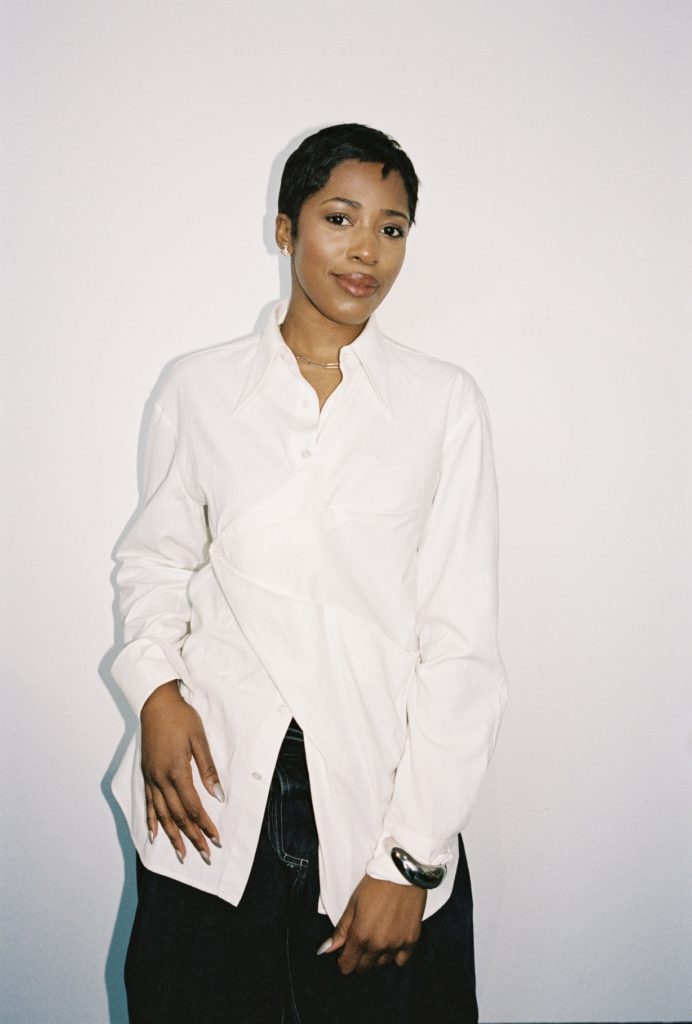
Bianca
© Bianca Saunders
Bianca Saunders Spring 2025 Men’s Collection at Paris Fashion Week
© Bianca Saunders
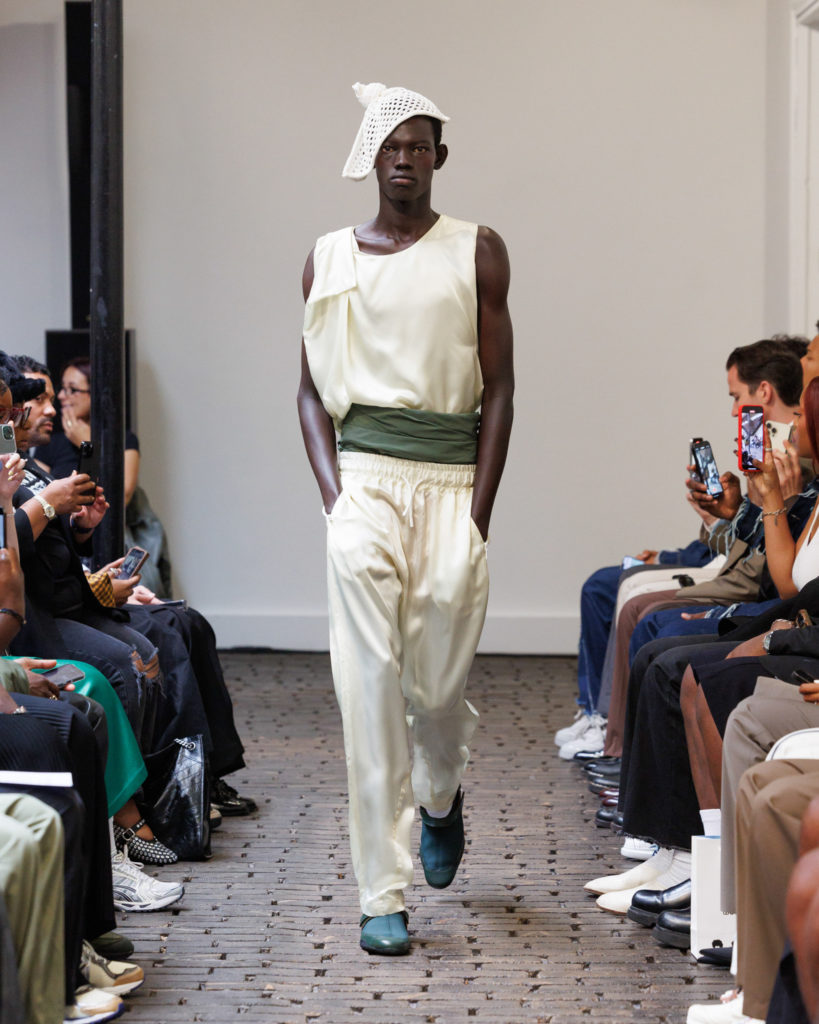
Rooted in her British Carribean identity, Saunders’ work draws from the rich social tapestry of her Anglo-Caribbean relations, exploring the psychology of men’s tailoring, identity and tradition through the lens of her South London upbringing. With a growing commitment to circularity, the brand also works with repurposing dead-stock and regenerative materials, ensuring sustainability remains a central focus.
Since launching her namesake label in 2017 – fresh from graduating from the Royal College of Art’s prestigious Masters in Menswear – Saunders’ rise as one of London’s most distinctive voices has been swift. She’s amassed an impressive list of accolades, including the BFC/GQ Designer Fashion Fund (2024), the New Establishment Menswear Award (2023), the ANDAM Grand Prix Fashion Award (2021), a spot on Forbes’ ‘30 Under 30’ list (2020), and a place on the Business of Fashion 500 (2023).
Now, as she prepares to join the Evo Fashion selection panel, we caught up with Saunders to to discuss her design process, building a brand in today’s fashion landscape and the one piece of advice she’d give to her younger self.
Why did you set up your label, and was there a particular turning point that marked your success?
I started my label because I wanted to challenge the traditional notions of masculinity through tailoring and offer a new perspective that felt personal, honest, and reflective of my background. I didn’t see many brands speaking to or representing the nuances of Black identity in fashion, especially in menswear. A turning point came when I was selected for the NewGen programme and then showed in Paris for the first time! That exposure opened the door to international retailers and press, which helped solidify my brand’s presence on a global stage.
How do sustainability and circularity inform your design process and brand values?
Sustainability is built into the way we think about design. I focus on longevity and making pieces that are made to last and feel timeless, rather than trend-driven. We use responsible materials where possible and produce limited runs to avoid overproduction. I also believe in designing with purpose: each collection builds on the last, often reinterpreting and reworking archive pieces, which naturally encourages a circular approach.
What do you think are the most important things to focus on when building a brand in today’s fashion landscape?
Clarity and community. You have to know exactly what your brand stands for and be able to communicate that consistently across every touchpoint, from the product to the storytelling. At the same time, building a community around your work is crucial. People want to buy into a brand that represents more than just clothing; they want to feel part of a world. Integrity and authenticity are what make a brand stand out today.
If you could offer one piece of advice to yourself at the start of your business journey, what would it be?
Trust your instincts, and don’t feel pressured to do things the traditional way. There’s no one path to success, and often your uniqueness is the very thing that sets you apart. Also, get comfortable with the business side early… creativity will always be your foundation, but structure will help your vision grow.

Launching this October, Evo Fashion is a free, four-month programme supporting early-stage fashion brands and fashion tech founders in building resilient, future-facing businesses. Applications are now open. Find out more at evolearning.co/fashion.
Subscribe to our newsletter for the latest Fashion District updates, and follow us to keep up-to-date with our latest events and opportunities:
- Instagram: @fd_ldn
- LinkedIn: Fashion District London
Evo Fashion: Cohort Two Graduates at The Backroom Pitch!
On Tuesday, the spotlight shone brightly at The Trampery Old Street, where The Backroom Pitch marked the finale of the Evo Fashion programme. An evening steeped in innovation and ingenuity, the event brought together 24 start-ups, each with a vision to transform the fashion industry. From trailblazing sustainability solutions to bold new technologies, the event was a celebration of purpose-driven entrepreneurship, showcasing the power of creativity and dedication in tackling the fashion industry’s most pressing issues.
As the final Evo Fashion event of the year, The Backroom Pitch not only concluded the programme but also represented the beginning of an exciting new chapter in our founders’ entrepreneurial journeys. For each start-up, it was an opportunity to gain invaluable insight into their business’s potential – insight that will shape the future of their ventures. The event also provided an opportunity to connect with investors, business advisers, and industry experts, all eager to engage with the next wave of breakthrough ideas.
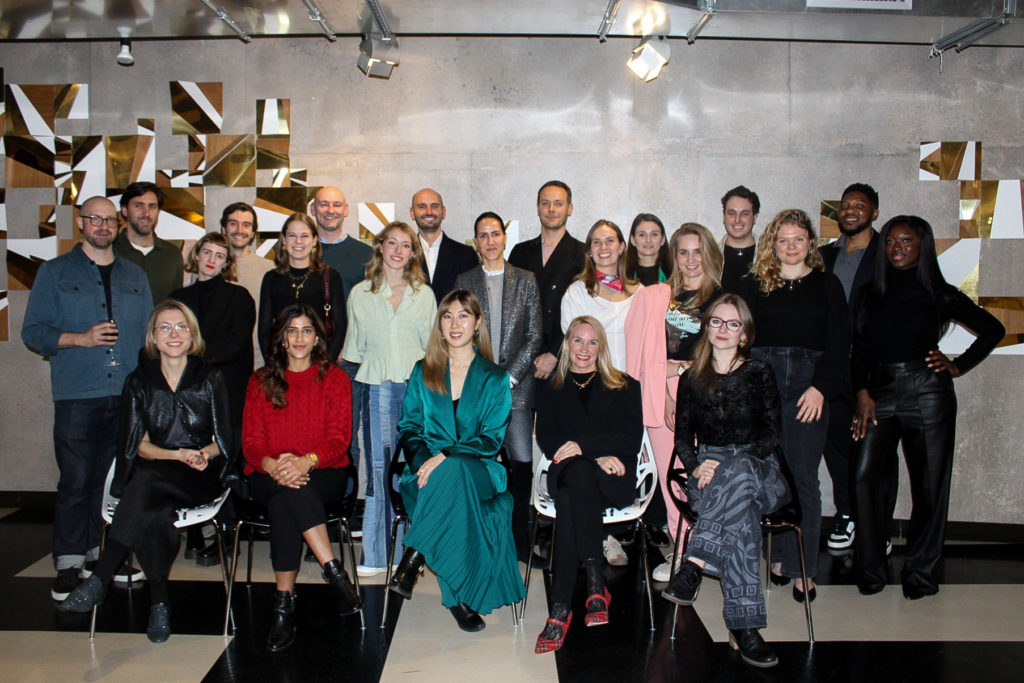
Evo Fashion
Delivered in partnership with Evo Learning – a training subsidiary of The Trampery, as part of London & Partners’ Grow London Early Stage Programme funded by the UK Shared Prosperity Fund – Evo Fashion delivered an experiential programme for start-ups and early-stage businesses that took an holistic approach to business strategy, helping them drive economic growth while also integrating sustainability into every aspect of their businesses.
Designed to fit in with work commitments and delivered by experts, the programme consisted of a two-day intensive launchpad and four full-day masterclasses which focused on different aspects of learning, including environmental and social governance, opportunities for innovation, sustainable growth and investment, finance and business planning, and founder wellbeing, leadership and impactful teams. Peppered in amongst the sessions and masterclasses, there was tailored 1-2-1 mentoring, three peer-to-peer learning workshops, and the opportunity to showcase and pitch to investors, business advisors, and industry experts at this week’s Backroom Pitch.
About The Backroom Pitch
Taking place across two spaces within The Trampery, the event saw founders pitch to carefully selected panels.
In the first room, start-ups pitched to experienced investors with knowledge on how to spot high-potential ventures. The focus was on investment readiness, with panellists offering constructive feedback that helped founders view their businesses through a financial lens. This was a key opportunity to pitch to seasoned investors and gain insights into how to attract funding and scale successfully.
Meanwhile, in the second room, a panel of five business advisers and industry experts offered a different kind of expertise. Here, the emphasis was on refining business models, improving pitch presentations, and assessing innovation strategies. The advisers provided actionable feedback that allowed each founder to refine their presentation skills, focusing on the strengths of their business and potential areas for improvement. This gave the start-ups the clarity they needed to take their ventures to the next stage.
Each pitch expressed creativity and innovation, with start-ups tackling sustainability challenges across an array of different areas, including:
- Retail and manufacturing technology
- Supply chain software
- AI and AR solutions
- Circular and regenerative practices
- New materials and textile waste innovations
- Digital innovation
After each pitch, panel members offered tailored feedback, asked thoughtful questions, and shared their expert advice. For the founders, it was a rare chance to showcase their businesses and receive feedback on their pitch, deck, innovation, business model, and more. Throughout the evening, guests enjoyed drinks and nibbles provided by INIS.
The highlight of the event was the opportunity for our startups to interact with an incredible panel of investors and advisers. The experts brought a wealth of experience and insight, helping each founder identify key areas for growth and development. A huge thank you to everyone who took part.
A Green Future
Marking the final event on the Evo Fashion calendar for 2024, this year has seen Fashion District and Evo Learning support 39 start-ups committed to making the fashion industry more sustainable, ethical, innovative, circular, and regenerative. We look forward to watching their next steps, offering support wherever we can, and we wish all Evo Fashion graduates continued success on their entrepreneurial journeys.
Want to stay up to date on Fashion District’s latest opportunities, news, and events? Sign up for our newsletter.
The WIP: Why Your Values Should Drive Your Business Partnerships
Have you heard about The WIP’s Expert Directory? This new platform is a one stop shop for all your environmental and social impact experts, offering the opportunity to connect with industry peers that share your values in business. In this article, Lucy Kebbell, Founder of The WIP, talks us through strategic partnerships and the myriad ways that they can support your business.
Business partnerships offer an excellent opportunity to grow your business, your brand awareness and to test new markets. A strategic partnership is understood to be an agreement between two or more businesses working together to achieve a common goal. Of course, these goals will be unique to the businesses in question, however, incorporating values into these partnerships is a vital ingredient for any values driven business.
Maybe you are looking to build a reputation around ethical business practices, or build trust and authenticity to help yourself stand out in a very crowded market place. Working with a business that doesn’t align with these values, or worse, openly works against these values could damage your reputation.
You should also think about any work you do with freelancers as a partnership too. A copywriter, PR or supply chain expert should share your values, or even hold them more deeply than you do, so that you can ensure that you benefit from their increased knowledge.
Why are Partnerships Important?
Partnerships can be big or small, but as long as it benefits your business in some way, it’s a strategic partnership. Partnerships can be leveraged to grow your brand awareness, create new customers, cement your values and share costs. For example, you might partner with a few other like minded businesses to create a pop up shop. You would share the cost of the putting on the pop up, and market the event together to each other’s networks. A drinks sponsor could also become a partner, again, allowing you to be ‘cool by association’ or simply grow your brand awareness with your partner’s audience.
Aligning your values to your partners cements your core values to your existing and potential customers. It allows you space to explore other ways to inhabit the values you hold and not stray outside of them. For instance, it wouldn’t make sense for an ethically made, organic clothing brand to partner with Starbucks in a Wetherspoons pub. Neither brand is known for its ethics, and one has been accused of greenwashing. This partnership would damage your reputation and confuse your customers.
This also counts for the experts and freelancers you may use in the business too. Since they will likely tell people they have worked with, it’s important to make sure that they understand your values and are aligned with them before you begin working together to prevent friction later on. If you choose an expert with a reputation for working in the fossil fuel industry, or for unethical businesses, this may damage your reputation too.
The Benefits of Values-Driven Partnerships in Fashion
Just any old partner won’t do. They should have some relationship to your business, and they should ideally be values-aligned. There are several benefits to this;
1. Strengthening your brand identity and authenticity
If our organic clothing company partnered with an organic fruit juice company or an organic homeware company, this strengthens the brand’s values in the organic space. It makes them look more authentic because they are partnering with other organic companies that have knowledge in their own space.
2. Appealing to new conscious consumers
87% of consumers would prefer to shop with a conscious business* so shouting about your brand’s values will win you more customers. These new customers could find you via a partnership because they are already loyal to the company you are partnering with.
3. Fostering long-term stability and growth
Values-driven partnerships are more resilient in the face of industry challenges and trends. They allow you to grow trust with your customers, making them more likely to come back and tell their friends about you too.
Identifying Values Alignment
First you need to be clear on your own values. Define your businesses values, whether it be ethical sourcing, environmental regeneration, supporting underrepresented communities or finding new homes for outlived items (circularity). It’s also important to understand your customers’ values too. There is a reason they are shopping from you but they may also care about other things so market research is crucial here to help you understand this.
Research potential partners’ values and practices through competition and market research. If you are already part of a community of small businesses with similar values to yours, this can be a great place to start. Think about the brand’s sustainability initiatives, labour practices, or materials sourcing. Also think about what events or partnerships they’ve have had in the past and whether these might appeal to your target market.
Practical Steps for Fashion Brands to Build Values-Driven Partnerships
Networking is a critical first step when it comes to fostering relationships with potential partners. Often, it’s the personal relationships we have with fellow business founders that form the basis of the best partnerships or collaborations. So get out there or get the word out to your networks that you are looking for values aligned partners.
Next, ensure you retain your values by factoring them into any agreements you have. It’s important to mutually agree upon who will be responsible for what. Make sure you advocate for your values throughout the process, from asking how much staff might be paid, or querying where potential waste might end up.
Communicate effectively by having a marketing plan agreed upon by all parties. Ensure that products and designers are credited fairly, and that everyone shares the burden of social media or digital marketing before, during and after the partnership.
Partnership Success Case Studies
Fanfare partners with Stelar
Stelar is known for it’s ethically made, woven handbags that support handweavers in Bali to fairly monetise their skills. They teamed up with circular denim brand Fanfare to use denim offcuts from production of their jeans, to be used to weave handbags. This partnership is genius because it was born out of Fanfare’s circular mission but it introduces their customer to a fellow business who is also ethically minded and supplies the kind of stylish handbags that their customers might love.
Monica Vinader with Mother of Pearl Founder Amy Powney
Monica Vinader has been busy changing it’s reputation in the last few years to align with it’s ethics, so this partnership with ethical clothing brand Mother of Pearl is a winner. Amy helped design the capsule collection of jewels featuring ethically sourced mother of pearl. She then used MV designed cufflinks in two limited edition organic and Tencel shirts for Mother of Pearls clothing line.
There are many benefits to partnerships for your values driven business, and the good news is that they are mutually beneficial. Partnerships enable you to grow and take advantage of other entrepreneurs or experts knowledge to bolster your business, and grow your customer base.
Not sure where to start? Explore The WIP’s Expert Directory to find fashion experts and partners aligned with your values.
*Source: PwC consumer survey
Are you a fashion start-up or SME looking for opportunities to support your business? Follow us to keep up-to-date with our latest events and opportunities:
- Instagram: @fd_ldn
- LinkedIn: Fashion District – London
Evo Fashion: Cohort Two Announced!
Following the success of the first round of Evo Fashion earlier this year, here at Fashion District, we’re beyond excited for our second cohort to embark on this experiential, high-impact programme.
With this round specifically catering to fashion technology ventures, we’re thrilled to unveil the twenty-four start-ups offering innovative solutions for the fashion and materials industry, each with the potential to advance sustainability in the sector.
What is Evo Fashion?
Designed exclusively for fashion technology businesses, the second round of Evo Fashion is a fully funded, five-month programme that takes an holistic approach to business strategy. With a focus on key areas such as environmental and ethical practices, business and financial planning, marketing and storytelling, founder wellbeing, and sustainable growth, the programme offers a comprehensive learning experience. Activities include a two-day intensive launchpad, masterclasses, peer-to-peer learning, panels, talks, and workshops – all structured to accommodate work commitments and culminating in an industry showcase.
Evo Fashion is part of the Grow London Early Stage programme, powered by London & Partners – a business support programme for early-stage growth companies active in high growth sectors that support sustainable and inclusive growth in London. The programme is funded by the UK Government through the UK Shared Prosperity Fund.
Introducing the Second Cohort
Meet the twenty-four businesses selected for the first Evo Fashion programme:
ASTRA
Astra is a pioneering tech startup that masterfully integrates Virtual Reality (VR) and Artificial Intelligence (AI) to redefine traditional in-store retail experiences. Our cutting-edge platform allows customers, to preview upcoming fashion collections in VR, providing brands with critical data on consumer preferences and infusing a dynamic element of gamification into the physical shopping experience.
Bloomino
Bloomino provides AI-driven software that automates fashion resale and rental listings from purchase receipts. Our solution generates detailed listings with 16 key fields, including descriptions and photos. As a white-label product, we integrate with existing platforms to accelerate transactions, enhance accuracy, and increase appeal, simplifying engagement in the resale market.
British Pasture Leather
British Pasture Leather is the first supplier of leather from the hides of cattle raised on regenerative farms in the UK. Our mission is to connect design with ecosystem restoration through the production of leather. We supply designers with material that delivers positive impacts for land, animals, people, and nature.
CircKit
CircKit is the AI-powered ‘Circular by Design’ solution empowering fashion brands to design sustainable products, harmonise their data, and meet regulatory compliance. CircKit’s holistic algorithm aggregates environmental, social and economic factors. An award-winning SaaS platform, accelerating positive impact as a ‘nucleus’ technology solution for a circular global fashion value chain.
CQ Studio
CQ Studio is a regenerative fashion lab conducting the research & development of innovative materials by using regenerative practices including using mushrooms to clean textile-dye wastewater to make our detox bio-embellishment (patent-pending). They use various techniques in their research combining contemporary and traditional craft techniques.
Creanial
Creanial is revolutionising fashion with its portable robotic garment manufacturing hub, blending automation, sustainability, and accessibility. By tackling industry challenges, Creanial empowers designers and meets diverse consumer needs. This innovative approach paves the way for a more sustainable, inclusive future in fashion, minimising environmental impact while maximizing creativity and efficiency.
Della Yellow
Our innovation is a digital sewing school designed to make fashion-forward sewing, upcycling and repair skills accessible to Gen Z and millennials. This platform offers up-to-date tutorials and projects that reflect the latest styles, coupled with sustainable practices. Leveraging AI technologies, our platform will provide personalised learning experiences and real-time feedback.
ELVARDI
ELVARDI creates stylish, sustainable sneakers for the fashion-forward adults. Our footwear blends trendy colourways and elegant eco-friendly materials, emphasising sustainability through product care, recycling, and reselling. Each purchase supports underserved creatives, allowing our customers to express their style while making a positive impact on the world.
Eslando Circular Fashion
Eslando is a circular fashion tech company on a mission to accelerate textile recycling. Our aim is to create the easiest and most efficient path to recycle textiles. Our Artificial Intelligence (AI) powered software leverages Digital Product Passports (DPP) to sort textile waste for recycling with pinpoint accuracy.
Fung Studios
Stephy Fung is a digital fashion artist, educator, and content creator in London. She blends urban streetwear with traditional Chinese elements, aiming to establish a Web3 digital fashion brand. Her designs, reflecting her British Chinese heritage, bridge the gap between physical and digital fashion.
Galore.club
Galore.club integrates NFC tags and blockchain to create Digital Product Passports for luxury textiles. This technology addresses three key industry challenges: supply chain opacity, limited data retention, and product authenticity. By creating digital twins, Galore.club syncs product data, offering real-time lifecycle visibility to stakeholders, thereby revolutionising luxury retail and manufacturing infrastructure.
Gemell Technology
Gemell is tackling the needless overproduction of fabric and yarn samples with 3D visualisation technology. Gemell’s offering is unique, generating photorealistic digital twins of yarns and fabrics down to the filament level, using only the data from the yarn recipe and the weave pattern file. No samples. No scanning. No waste.
Genie
Genie is a search engine and shopping tool for pre-loved fashion. With the pre-loved fashion market expected to grow at 77.8% from 2023-2028 there has been an explosion in inventory and pre-loved shopping destinations. However, each product is unique making it challenging to find what you’re looking for and stay on top of what is available on the market. Genie allows users to set alerts on particular categories or products to source what they are looking for from across the internet.
Labelld
Labelld is a pioneering company specializing in digital product passports and post-purchase experiences. Leveraging Web3 technology, we enhance brand-customer relationships through blockchain-based authenticity, traceability, and innovative after-sales services, driving engagement and loyalty in the luxury and fashion sectors.
LAYBL
LAYBL creates unique connections for retail brands by tracking clothes from production to recycling, extending their reach, preparing for EU DPP and reducing carbon footprints. And our smart wardrobe app connects these items to their buyers, encouraging product longevity using AI and gamification to make being eco-friendly, easy and fun.
Loom
Loom connects you with designers to upcycle (redesign) your unworn and damaged clothes. Simply tell us about an item you no longer wear and we give you ideas on how we could transform it. Or if you have an idea already, we’ll bring your vision to life!
Or Collective
Or Collective is the first design-led rental subscription for babies and children. A tech-first model working with all the cult kids wear brands, or collective curates current, high quality fashion led collections that are available for members to rent, wear and rotate as they need.
PhygitalTwin
Our AI engine provides a seamless, cost-effective gateway to 3D digital product creation, automating and scaling the design of skins and fashion collections. It converts these into production-ready patterns in real time, enabling mass customisation, and sustainable production, revolutionising the fashion industry’s design-to-production process. Designs can effortlessly be transformed into skins for your favorite games or social media profiles, creating opportunities for validation and additional revenue streams.
Redress
An AI-powered platform that provides personalised outfit recommendations by analyzing trends, styles, and user preferences. It empowers discovery through tailored and dynamic experience, enabling users to access, interact, and act upon bespoke and relevant information. We believe in a new way of shopping.
SEWN DIGITAL
At SEWN DIGITAL FASHION, we envisage an industry where digital garments and AI imagery are developed alongside physical products. Our innovative approach addresses industry challenges such as waste reduction, carbon reduction, efficiency, and accuracy through cutting-edge fashion tech solutions.
TEOZ
TEOZ’ mission is to create fashion that goes beyond what is possible in the physical world. Our goal is to create new possibilities for people to engage with fashion by leveraging mixed reality technology and innovative production approaches. We make fashion that is kinder to the environment and more fun.
THE FASHION BLUEPRINT
THE FASHION BLUEPRINT (TFB) is a community-focused digital agency promoting sustainability in fashion. It supports underrepresented fashion entrepreneurs and connects freelance Fashion Upcyclers with retailers to reduce deadstock and combat waste colonialism. TFB’s tech platform aids brands in joining the circular economy and addressing fashion waste issues.
VAIVR
VAIVR transforms online fashion retail with advanced 3D virtual try-on technology. Shoppers create precise 3D avatars from a single photo to try on garments in their exact size. We simulate realistic fabric behaviour and movement, enhancing fit accuracy and customer confidence, leading to reduced returns and better shopping experiences.
Zori Tex
Zori Tex is a climate tech start-up on a mission to drive circularity in the hugely resource intensive fashion and textiles industry through innovative AI-powered technologies – combining machine vision and the latest deep learning networks to optimise the sorting and availability of complex non-reusable feedstocks, ready for closed loop recycling.
Want to stay informed about the latest developments in the Evo Fashion programme? Subscribe to the Evo Fashion newsletter:
Fibe wins Manufacturing Futures Innovation Challenge
Fashion District announced the winner and runner-ups of Manufacturing Futures 2024 at an Awards Evening hosted in The Conduit’s Ubuntu Lounge.
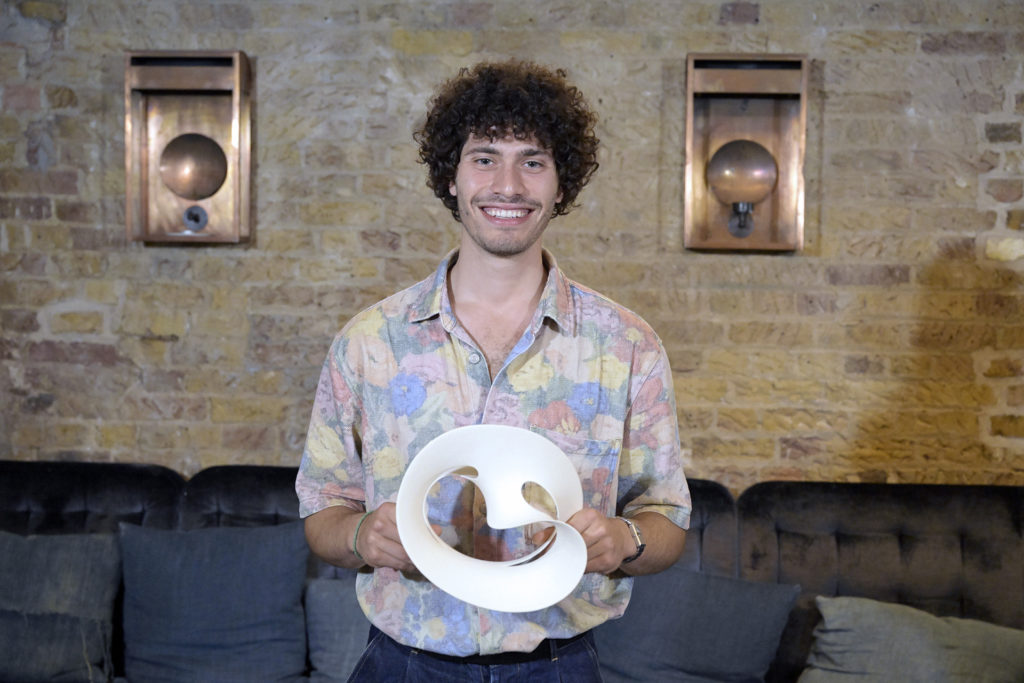
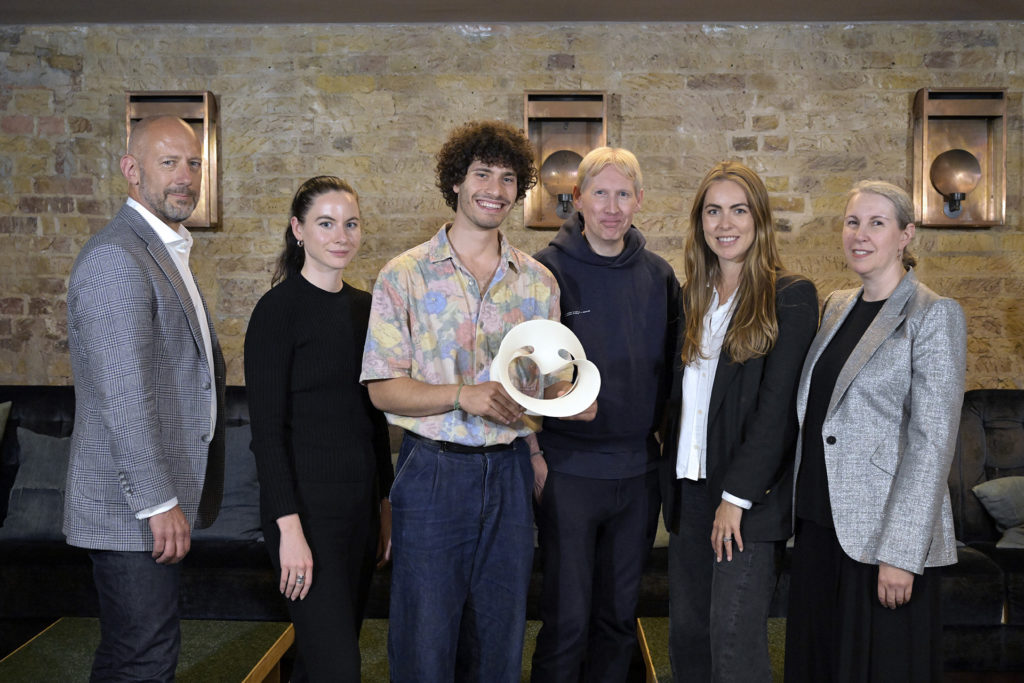
Fashion District has announced Fibe as the winner of its 2024 Manufacturing Futures Innovation Challenge. Fibe is a material science startup developing the world’s first textile fibres out of potato harvest waste. The company is developing the most scale, affordable and sustainable textile fibres with comparable performance to mainstream materials. They will receive £15,000 to advance their innovation and grow their business.
The winner was chosen by a judging panel of industry experts, including Ella Gould, Head of Sustainability and Innovation at Selfridges; Chelsea Franklin, Head of Advanced Concept Design at PANGAIA; Gillian Lipton, sustainability consultant most recently at Alexander McQueen; Matthew Drinkwater, Head of Fashion Innovation Agency at London College of Fashion, UAL; and Adam Mansell, CEO of UKFT.
Ella Gould, Head of Sustainability and Innovation at Selfridges and Manufacturing Futures judge, said:
“I feel so energised and hopeful after seeing such a broad spectrum of pitches solving problems across fashion’s entire value chain. The judges were unanimous in Fibe winning this year’s award. The energy in the room after their pitch was palpable and we so look forward to seeing them take their fiber innovation to the next level. Who knew potatoes were so exciting!”
Idan Gal-Shohet, co-founder of Fibe, commented:
“I’m really excited about winning the Manufacturing Futures prize. I’ve known many of the start-ups in this programme for a long time and have so much respect for them, which is why winning this prize means so much to us. The funding will be used to expand our business, so we are able to harvest a variety of different crops and create better conditions for farmers around the world. Our mission in the end is to create materials that use far fewer environmental resources than what’s currently available. Thank you so much to the judges and organisers for giving us this great opportunity to grow Fibe.”
The runners-up, who will each receive £5,000 for their business, include Sequinova, who are making biodegradable sequins out of cellulose; and Fab Materials, who are converting hard to recycle fashion waste into valuable boards and composites, such as furniture.
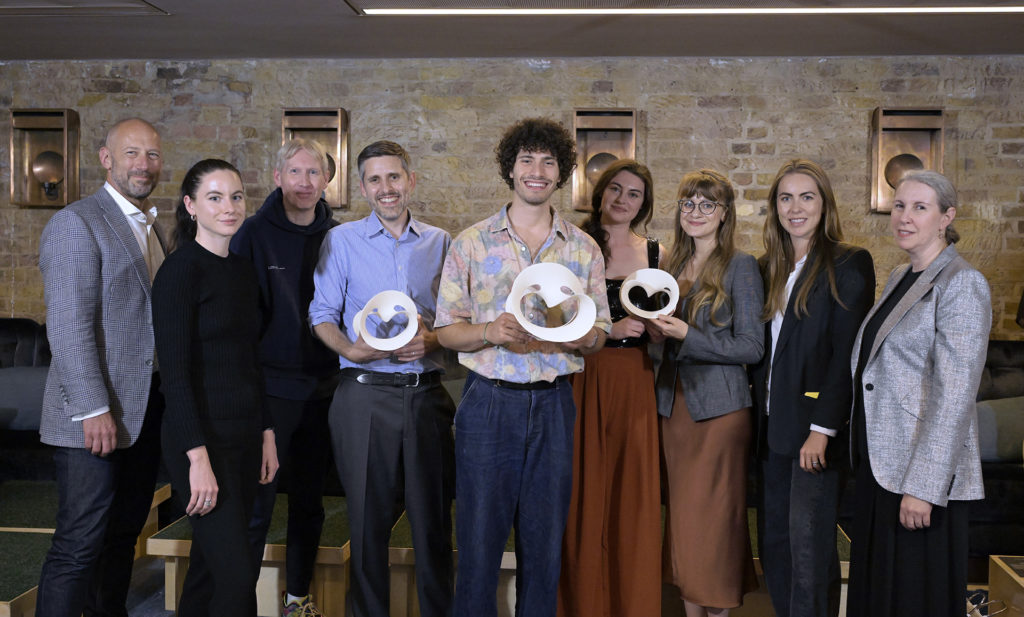
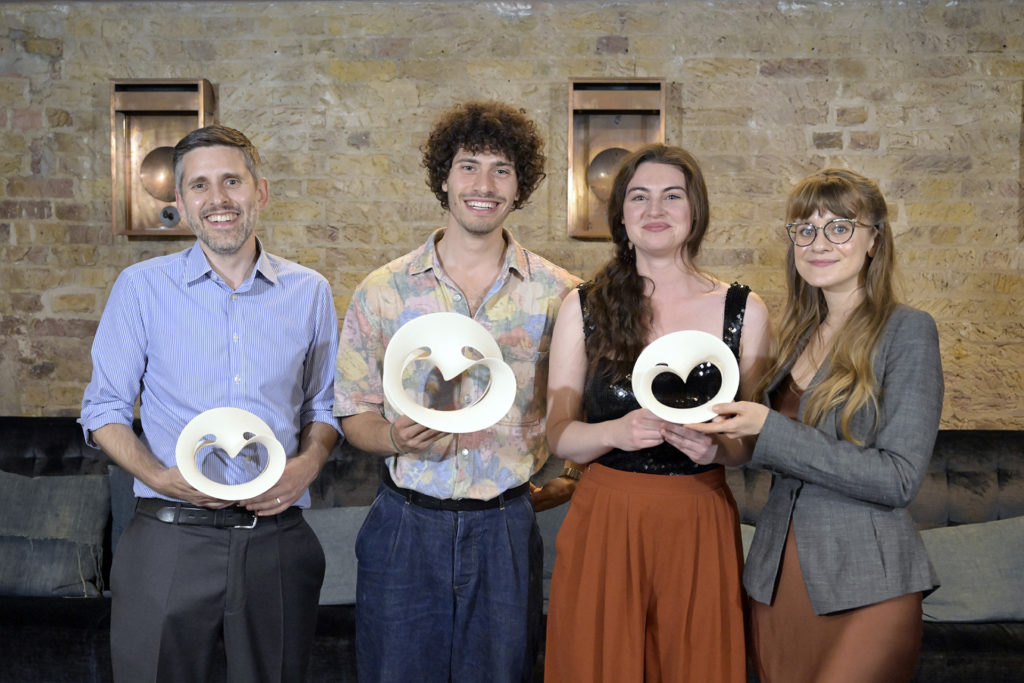
Helen Lax, Director of Fashion District commented:
“Congratulations to Fibe for winning this year’s Manufacturing Futures Innovation Challenge. I am thoroughly impressed by the talent and creativity of all the start-ups who took part in this year’s challenge and am hopeful for the future of the industry. There’s plenty we can do to improve and start-ups like these take us one step closer to achieving tangible change.”
The following brands were also part of the 2024 iteration of Manufacturing Futures: Innovation Challenge:
- Arda Biomaterials – turning spent grain from the beer brewing and whisky distilling industries into a novel, leather-like material
- Fiiba – scaling sustainable materials for the fashion industry made from 100% agricultural waste
- Oxford Biopigments – plant-based dyes that are naturally lightfast and perform like synthetic dyes
- PACT – creating performance and aesthetic ready textiles made from collagen sourced from industrial by-products
- The Seam – the wardrobe care & repair service powered by intelligent tech, that pairs specialist makers with people and brands to keep fashion out of landfill
- TRUSS – simplifying the resale process through instant access to actionable data
- Zori Tex – using the latest technology to optimise the sorting and availability of complex non-reusable textiles
We would like to thank The Conduit for hosting the Manufacturing Futures Innovation Challenge awards ceremony, and everyone that joined us to celebrate.
All images: Christian Sinibaldi
Stay up-to-date on our latest events and opportunities by following us on Instagram and LinkedIn:
- Instagram: @fd_ldn
- LinkedIn: Fashion District – London
Manufacturing Futures 2024 kicks off with Critical Friends Day at Plexal
Last week, we gathered our 10 shortlisted businesses at Plexal’s Innovation Centre for Critical Friends Day, officially launching our 2024 programme.
Taking over the spacious venue, the day was meticulously organised for our 10 shortlisted businesses – Arda Materials, Fibe, Fab Materials, Oxford Biopigments, TRUSS, Sequinova, Zori Tex, Fiiba, PACT, and The Seam – to present their businesses to industry experts and receive valuable feedback ahead of their final presentation to the judges.
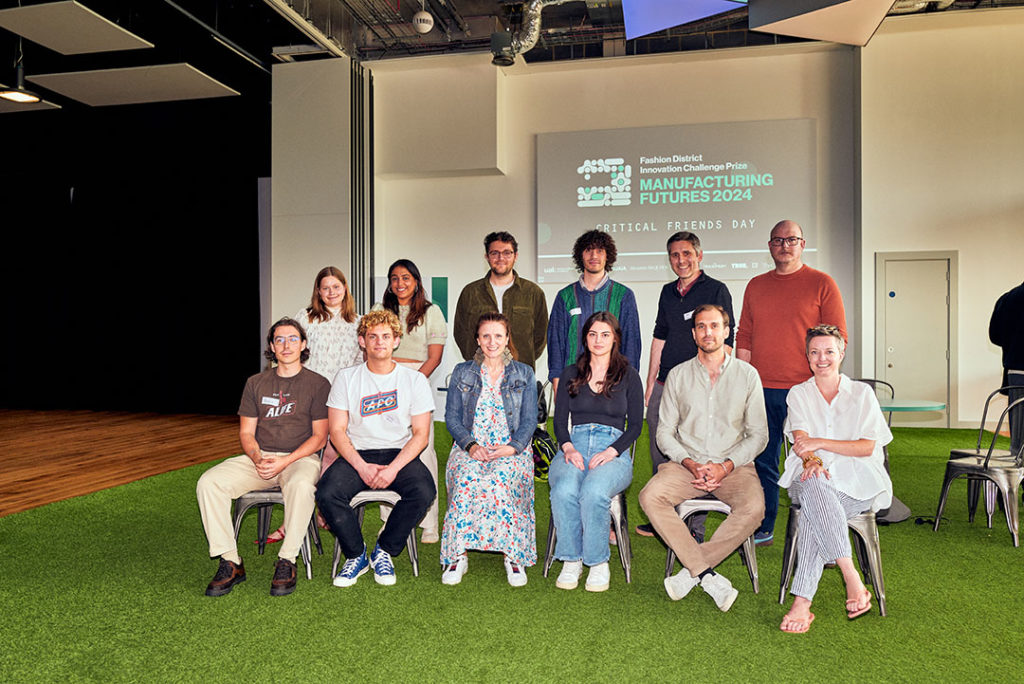
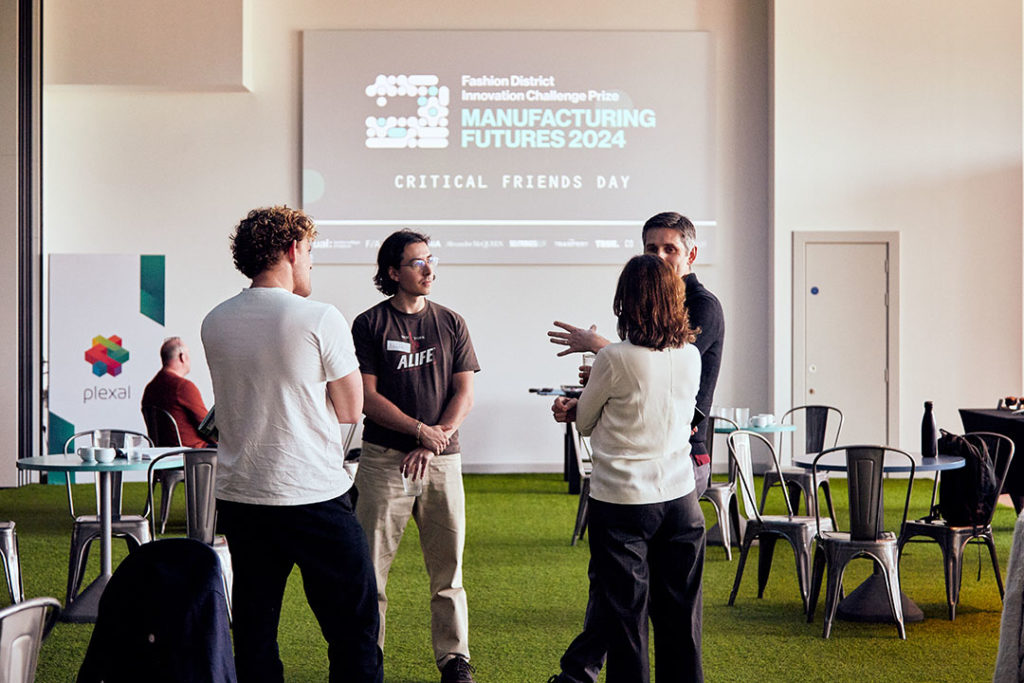
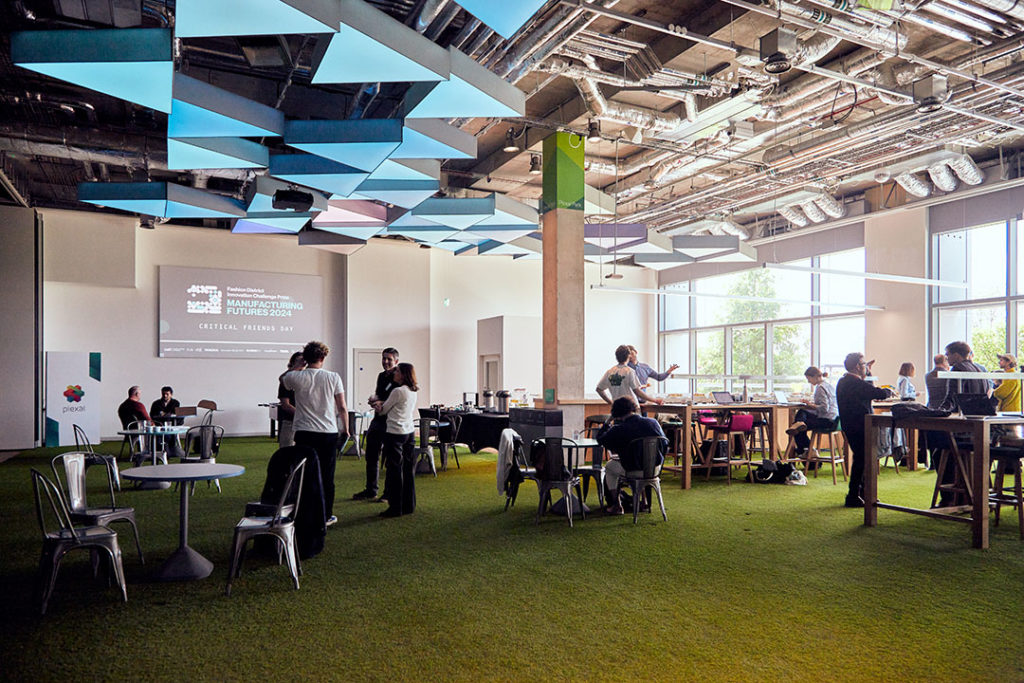
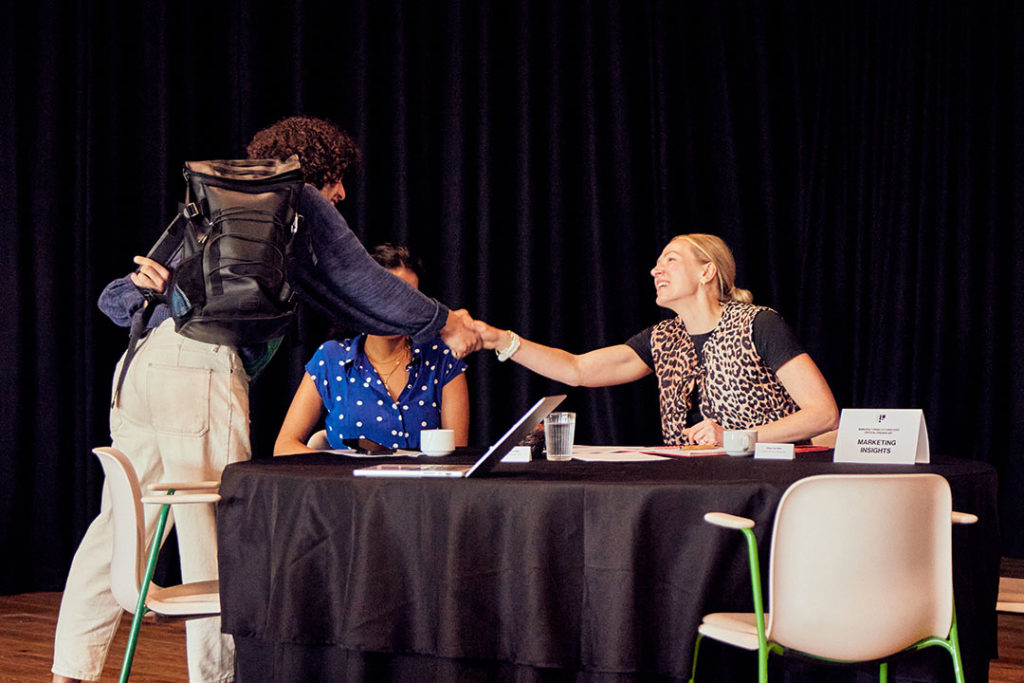
Our Expert Lineup:
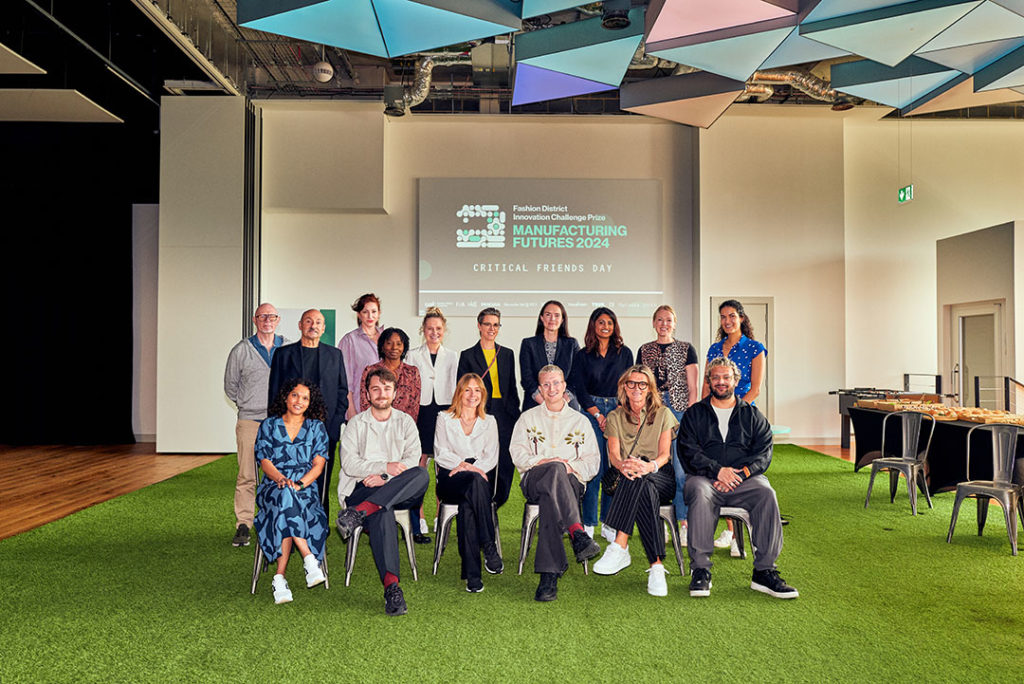
Manufacturing Innovation and Sustainability
- Moin Roberts-Islam | Technology Development Manager, Fashion Innovation Agency, LCF, UAL
- Rory Hugill | Senior Innovation Portfolio Manager, PANGAIA
- Daniel Whitley | Strategic Design Manager, Ellen MacArthur Foundation
- Katarina Rimarcikova | Founder, Fashion Industry Consultant and Senior Lecturer, ALIGN Studio
Manufacturing Production
- Anna Ellis | Head of Business Development, Making For Change, LCF
- Nicola Eibich | Circular Fashion Consultant, M-EASURE
- Gabrielle Shiner-Hill | Co-Founder, Bureau 555
Investment Insights
- Carol Hilsum | Co-Founder of StudioThree, Investment Advisor at TLF Ventures & Imaginary Ventures
- Aarthi Thangavel | Associate – Innovation, TRUE
- Thushara Sabreen | Innovation Strategist, UKRI
Marketing Insights
- Danielle LeToullec | Head of Marketing, True Global
- Elisah van Allen | Head of Social, 33Seconds
Business Growth and IP
- Jo Gregory (Partner) and Sheldon Cordell (Chairman) | Joelson Law
- Stuart Balmer | Fashion and Creative Business Consultant, Stuart Balmer Associates
- Holly Smith | Innovation Lead, Plexal
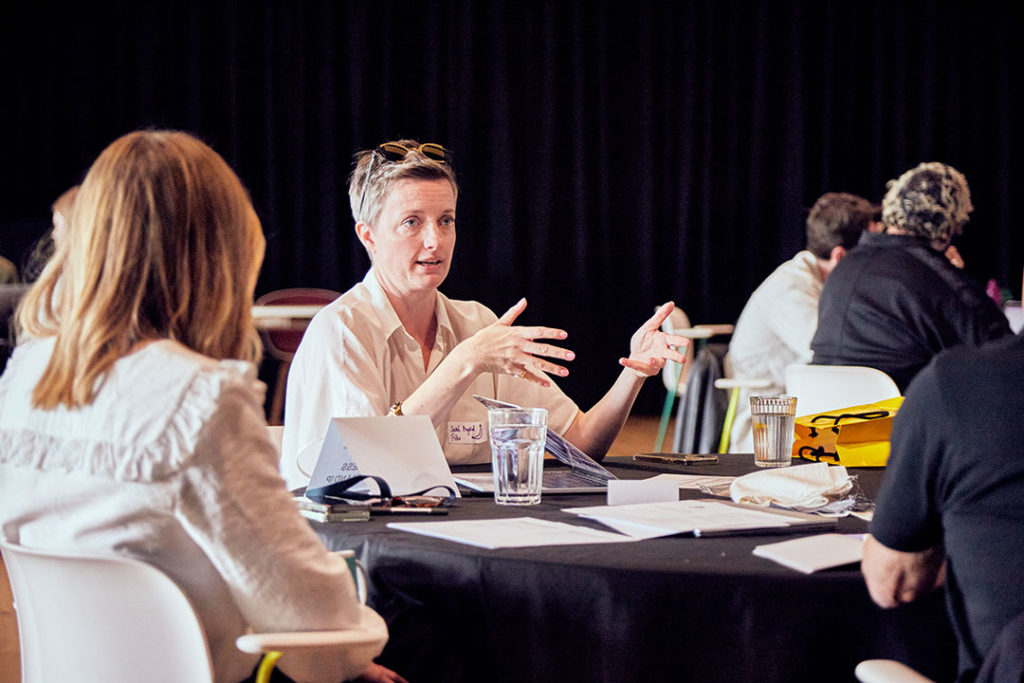
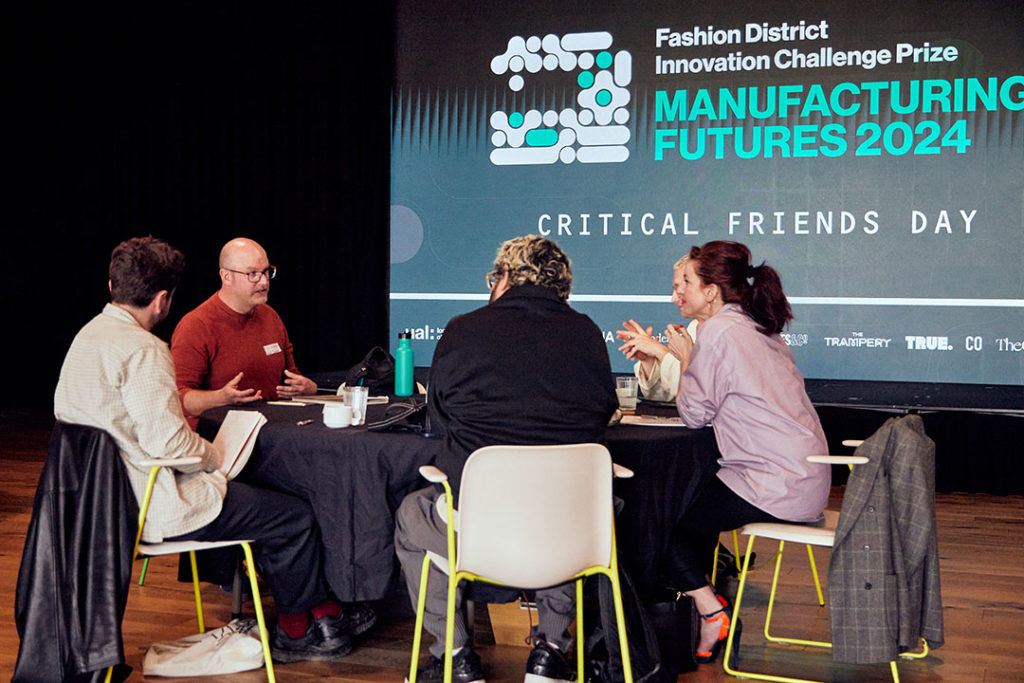
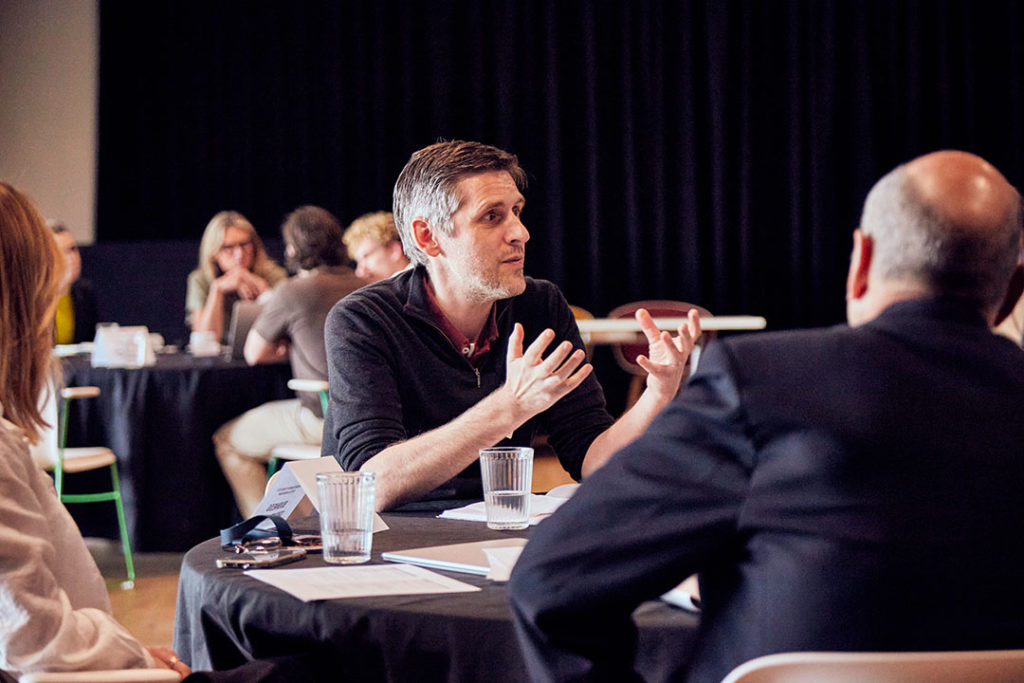
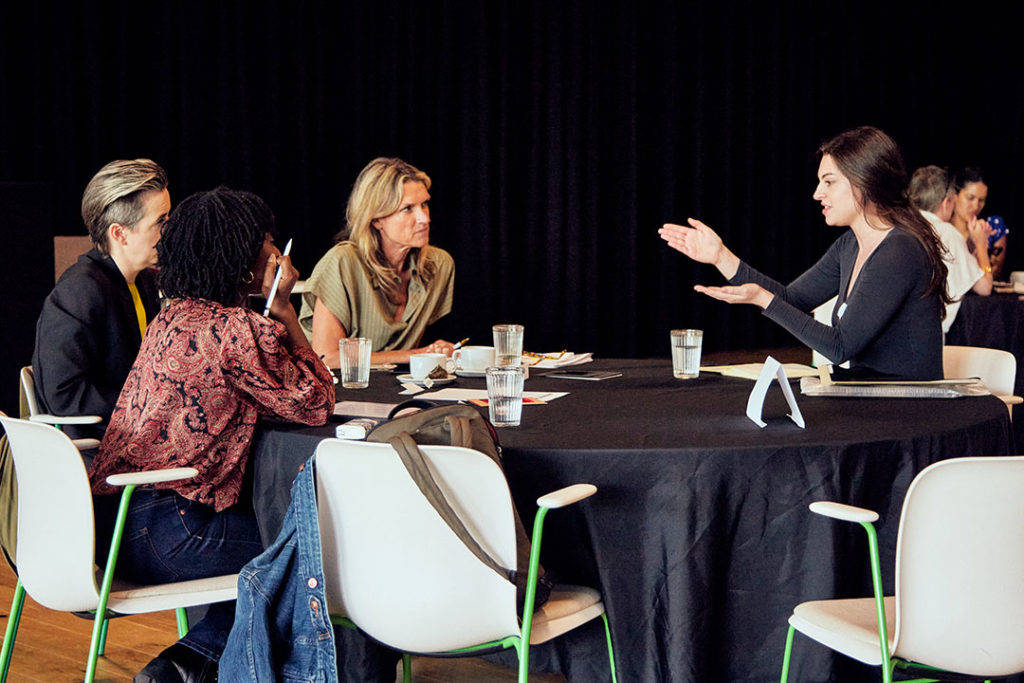
Empowered by real-time feedback on their businesses, many of the startups left with actionable steps outlined by the critical friends to help elevate their growth. Throughout the day, breaks in the timetable provided ample opportunities for the businesses to get to know each other, fostering the exchange of ideas, opportunities, and mutual support.
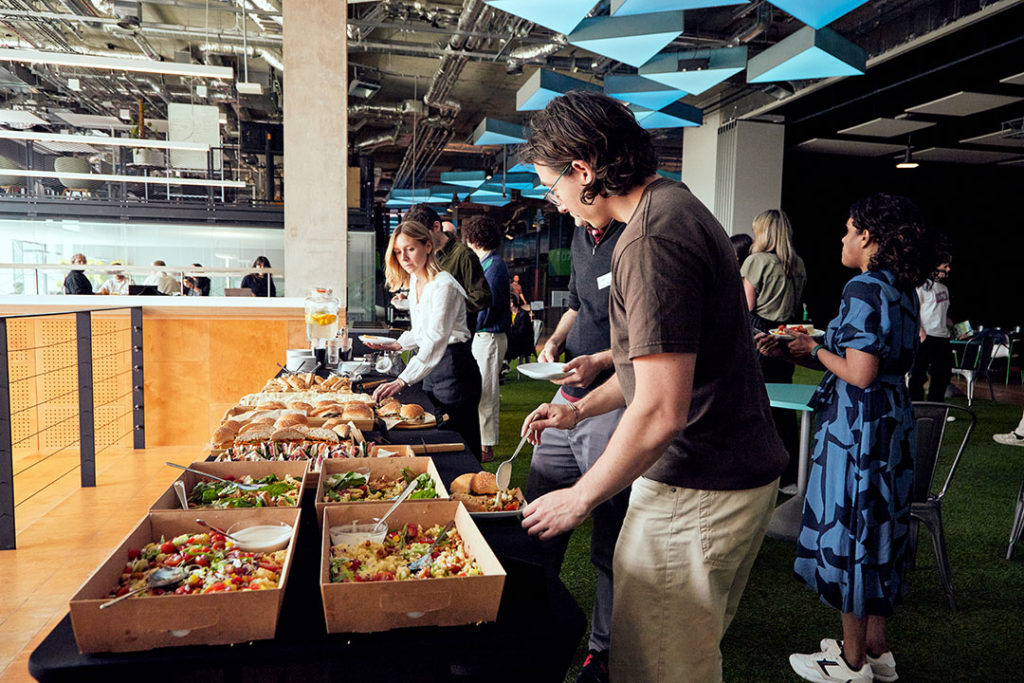
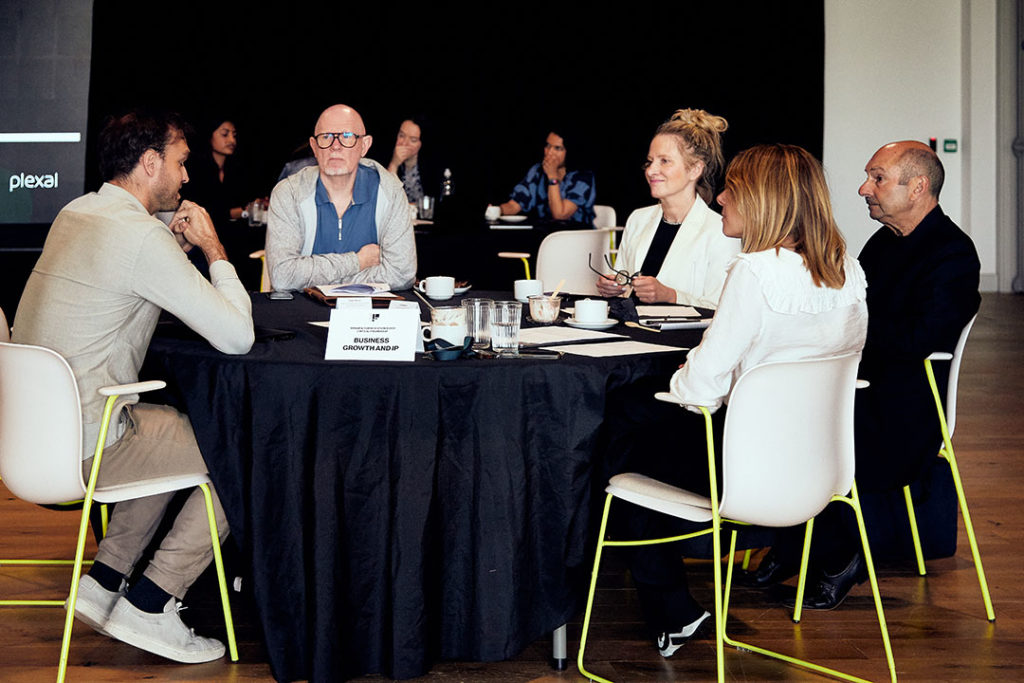
Fuelled by the high energy in the room, the day proved to be a resounding success, leaving our shortlisted businesses eagerly anticipating our upcoming event, the Development Day on 30th May. Closing the event, the startups were given the opportunity to offer feedback about their experience. Woody Lello, CEO of TRUSS, spoke on behalf of them all, saying, ‘It was a really fun day!’
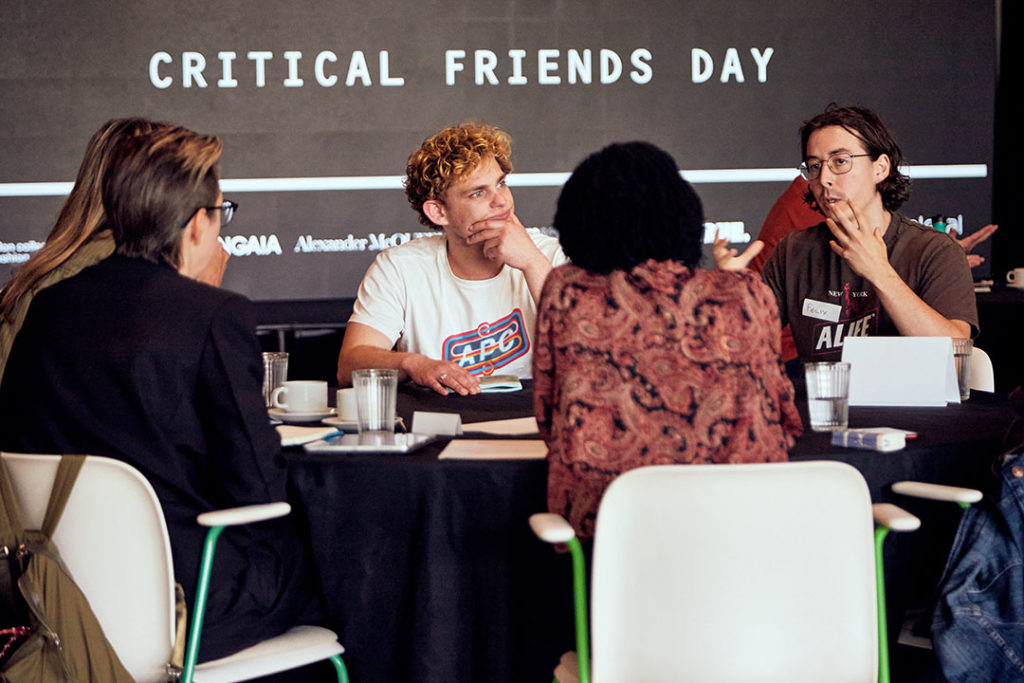
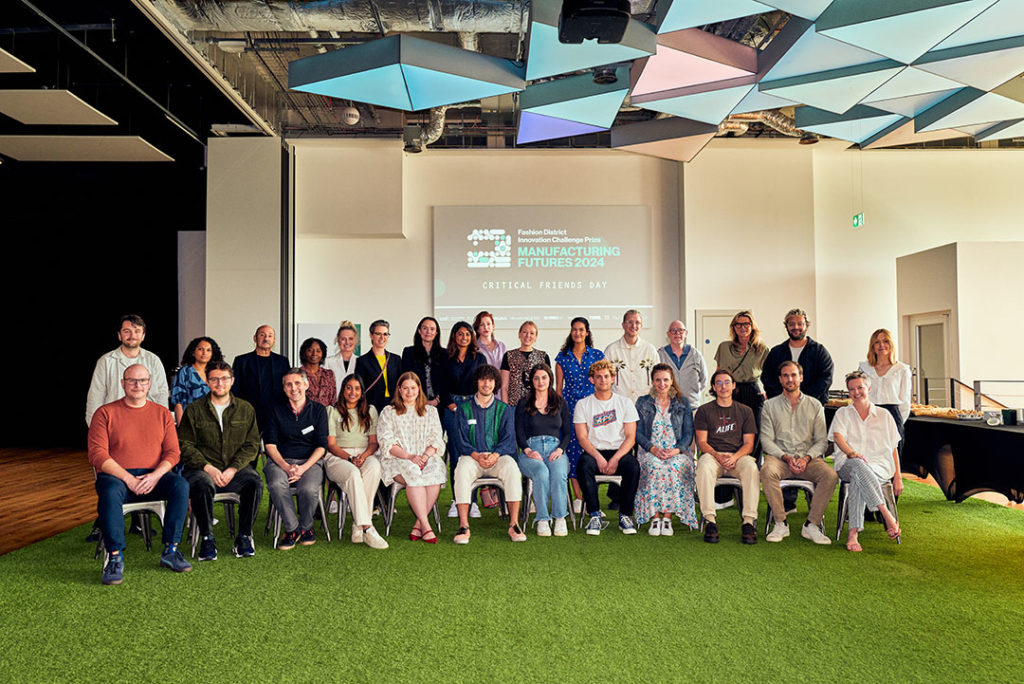
Stay up-to-date on the latest Manufacturing Futures 2024 news by following us on Instagram:
Manufacturing Futures: Shortlist Announcement!
Fashion District has announced the shortlist of 10 start-ups and SMEs in its coveted Innovation Challenge: Manufacturing Futures programme.
As part of the programme, the brands have the chance to win a £15,000 cash prize to develop their sustainable manufacturing business to make an impact on the fashion industry, chosen by a judging panel of experts in July.
The shortlisted start-ups are:
- Arda Biomaterials – turning spent grain from the beer brewing and whisky distilling industries into a novel, leather-like material
- Fab Materials – converting hard to recycle fashion waste into valuable boards and composites
- Fibe – creating new cellulosic materials from potato harvest waste
- Fiiba – scaling sustainable materials for the fashion industry made from 100% agricultural waste
- Oxford Biopigments – plant-based dyes that are naturally lightfast and perform like synthetic dyes
- PACT – creating performance and aesthetic ready textiles made from collagen sourced from industrial by-products
- Sequinova – cutting-edge, plant based, biodegradable sequin materials
- The Seam – the wardrobe care & repair service powered by intelligent tech, that pairs specialist makers with people and brands to keep fashion out of landfill
- TRUSS – simplifying the resale process through instant access to actionable data
- Zori Tex – using the latest technology to optimise the sorting and availability of complex non-reusable textiles
Helen Lax, Fashion District Director said:
“It is incredible to be part of something that has the potential to change the way an industry works and make a real impact for future generations. The shortlist of brands in this iteration of Manufacturing Futures is spectacularly strong, and one can’t help but be amazed by the sheer talent and innovation held by the next gen of changemakers.”
The shortlist was chosen by the Manufacturing Futures judging panel, consisting of industry experts Ella Gould, Head of Sustainability and Innovation at Selfridges; Chelsea Franklin, Head of Advanced Concept Design at PANGAIA; Adam Mansell, CEO of UKFT, Gillian Lipton, Sustainability Director at Alexander McQueen; and Matthew Drinkwater, Head of Fashion Innovation Agency at London College of Fashion, UAL.
Winners from the previous Innovation Challenges include Lone Design Club, a platform where independent brands and conscious shoppers meet; Sparkbox, a retail planning and optimisation platform powered by machine learning; and Biophilica for their entirely plant-based, compostable leather alternative, Treekind.
Fashion District was founded in 2018 with a goal to bring together fashion, technology, business and education in east London to meet, compete, collaborate and innovate. Fashion District works with a number of different partners to facilitate support programmes helping to develop a strong, sustainable network within the UK fashion industry. Spearheaded by Director Helen Lax, Fashion District is supported by London College of Fashion, UAL, and the Mayor of London.
MEET THE SHORTLIST
Arda Biomaterials
Arda Biomaterials transforms globally abundant waste and co-product streams into scalable, animal, and plastic-free biomaterials. Arda’s first transformation is turning spent grain from the beer brewing and whisky distilling industries into a novel, leather-like material called New Grain, for use in fashion, automotive, and other sectors.
Fab Materials
Fab Materials are on a mission to deliver planet scale upcycling of the world’s post-consumer fashion waste. Our breakthrough solution addresses the 90M tonnes of clothing that’s sent to landfill or incinerated annually. We convert hard to recycle fashion waste into valuable boards and composites.
Fibe
Fibe is revolutionising the industry by engineering cutting-edge technology to extract cellulosic fibres from potato harvest waste. This untapped waste, which amounts to 150M tonnes annually and cannot be fed to livestock or compost, has the potential to provide 70% of global non-synthetic clothing demand. Our fibres use 99% less water, produce 82% less CO2e and require no land compared to cotton.
Fiiba
Fiiba is a next generation textile developer, scaling sustainable materials for the fashion industry made from 100% agricultural waste. Fiiba fibre has 1/10 the carbon footprint of conventional cotton and a 100% transparent supply chain. Fiiba raises low-income farmers out of poverty by paying for their waste and providing free organic fertiliser (a natural by-product of Fiiba’s innovation) that promotes long-term soil health.
Oxford Biopigments
Oxford Biopigments (OBP) mission is to solve key problems associated with sustainable textile dyeing. To this end we have developed a world first in plant-based, sustainable dyes: naturally lightfast dye molecules, modified to work without additional binding agents, that are easily blended to generate new colours and are compatible with existing dyeing machinery. Crucially, our dyes have equivalent technical performance to modern synthetic dyes without the harmful environmental impact.
PACT
PACT designs elegant biomaterials made in harmony with the planet Earth. We’re committed to helping the world’s most innovative companies dream without boundaries. Our first biomaterial Oval is inspired by generations of leather artisans and master craftspeople, Oval is a supple material made from collagen sourced from industrial by-products. It’s a highly scalable material that offers designers unparalleled flexibility whilst minimising environmental impacts across the entire production process.
Sequinova
Sequinova is a pioneering biomaterials company, revolutionising the textiles industry with cutting-edge biodegradable sequin materials. Plant-based, non-toxic, and available in a variety of colours and effects, we’ve partnered with the world’s leading manufacturers in Europe and Asia to deliver production-ready eco textiles at scale.
The Seam
The Seam delivers wardrobe care & repair at scale, pairing local, specialist Makers with people and brands to keep fashion out of landfill, and in the loop. The Seam is the fastest growing care and repair service in the UK powered by intelligent tech. Their network of specialists includes tailors, cobblers, leather restorers, knitwear menders, skewer cleaners, embroidery artists and so much more.
TRUSS
TRUSS is a London-based fashion technology SME focused on enhancing the second-hand fashion market through AI solutions and in-depth research. TRUSS aims to simplify the resale process through instant access to actionable data, removing the need for online research and manual data entry, while prioritising information and narratives.
Zori Tex
Zori Tex is a climate tech start-up on a mission to drive circularity in the hugely resource intensive fashion and textiles industry through innovative AI-powered technologies – combining machine vision and the latest deep learning networks to optimise the sorting and availability of complex non-reusable feedstocks, ready for closed loop recycling.
This year’s Manufacturing Futures prize will include:
- Cash prize of £15,000 for the winner and £5,000 each for two runners-up
- Desk membership for a year at The Trampery workspace in Fish Island Village
- Membership to UKFT providing access to their annual programme of events and webinars, networking opportunities via their extensive pool of members and supporters, and the latest market insights
- Business membership for a year to Common Objective, accessing 30,000+ global connections, premium intelligence and training courses in sustainable fashion and manufacturing
- The runners up will also receive professional memberships to Common Objective
- Business development consultancy hours from PANGAIA
Stay up-to-date on our latest opportunities by following us on Instagram and LinkedIn:
- Instagram: @fd_ldn
- LinkedIn: Fashion District – London
Evo Fashion Applications for Round Two Opened at Tech Talks
Last week, we hosted Evo Fashion: Tech Talks in collaboration with Evo Learning at The Trampery Fish Island Village.
Celebrating the launch of applications for the second round of Evo Fashion, specifically tailored to fashion technology businesses, attendees found out more about the programme and specialist facilitators, experienced rapid-fire talks on all things fashion tech, and connected with industry peers.
Kicking off the evening, we heard from leading industry experts as they discussed the latest trends and developments in fashion technology. From the dynamic intersections between technology and sustainability, to delving into the realms of digital and phygital fashion, read on to find out what went down at this jam-packed evening event.
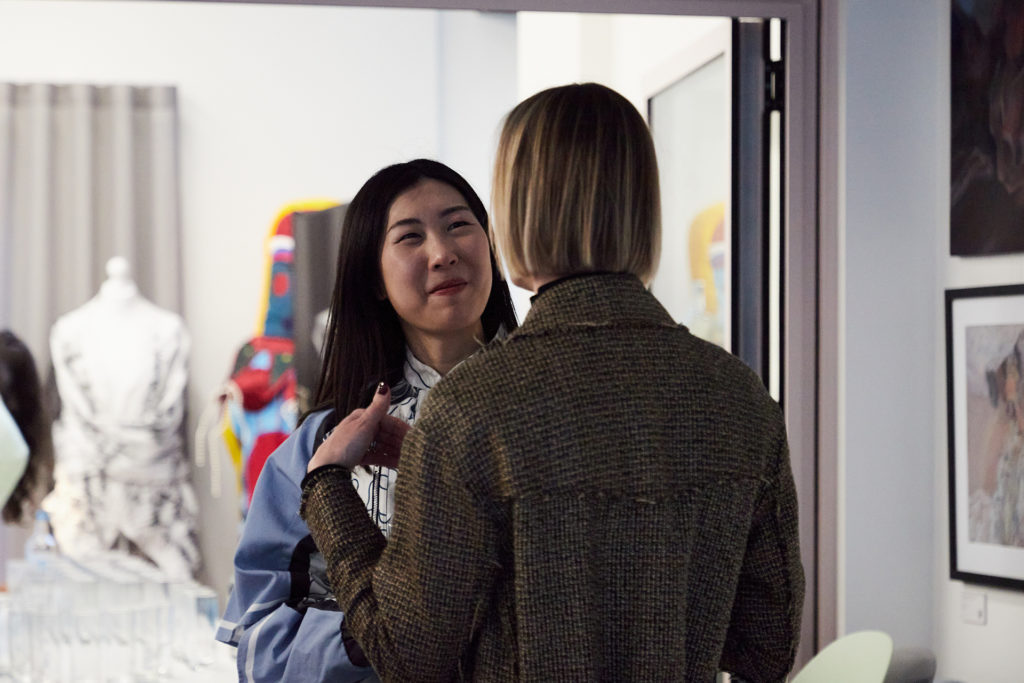
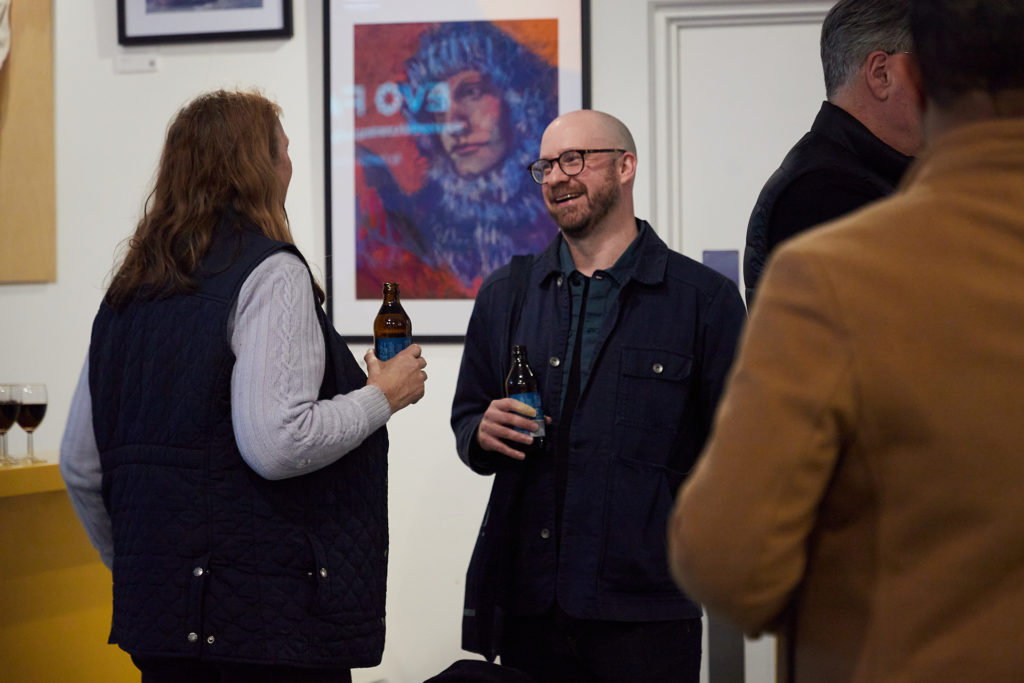
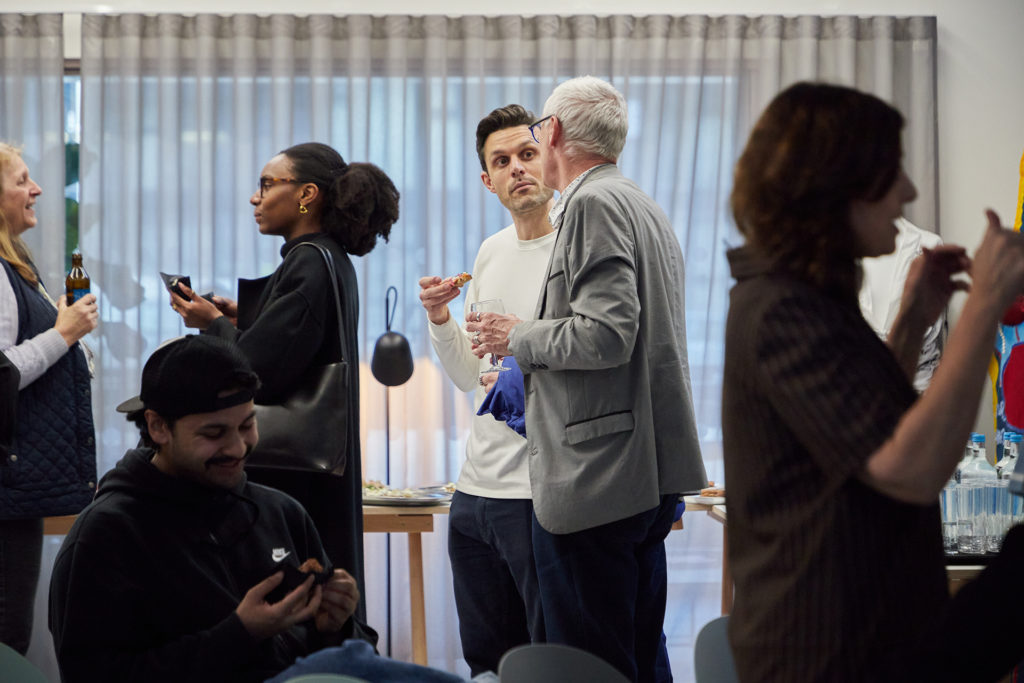
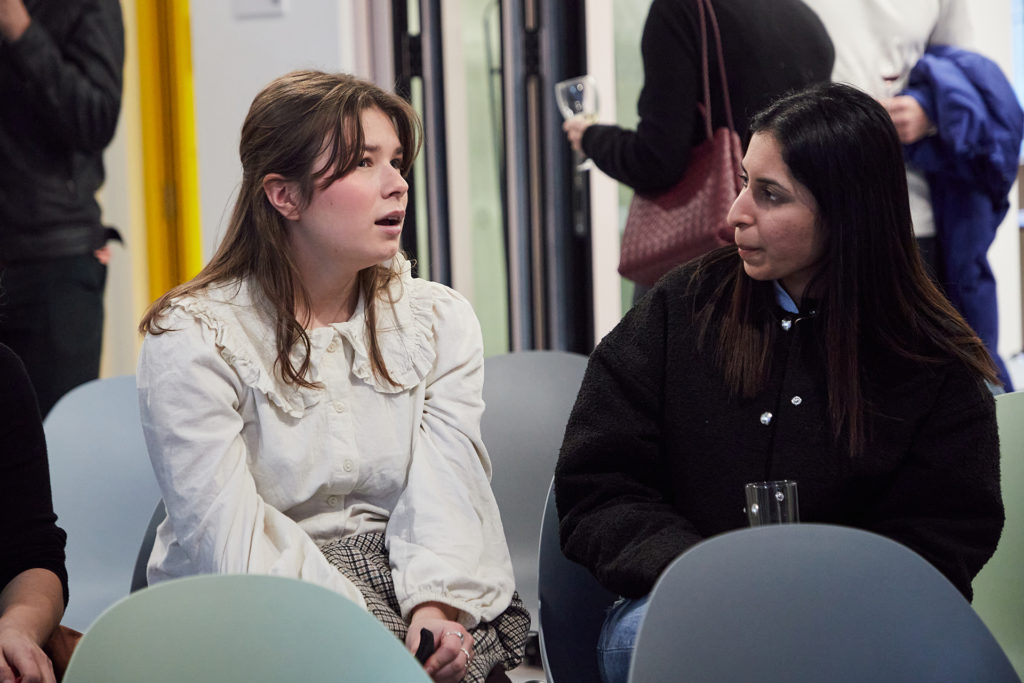
Fashion Tech Trends and Developments with The Fashion Innovation Agency
First up, Lisa Chatterton, Business Manager at Fashion Innovation Agency, took to the stage to present the latest trends in fashion tech with a focus on innovations that could support the transition towards a more sustainable fashion industry.
Speaking about the FIA’s latest work, Lisa dived into a range of topics including photogrammetry, digital humans, deepfake technology and generative AI. ‘You no longer have to fly a model up a mountain, you can do it all virtually,’ said Lisa. ‘By taking a digital asset into a virtual environment, one photoshoot can have endless possibilities.’
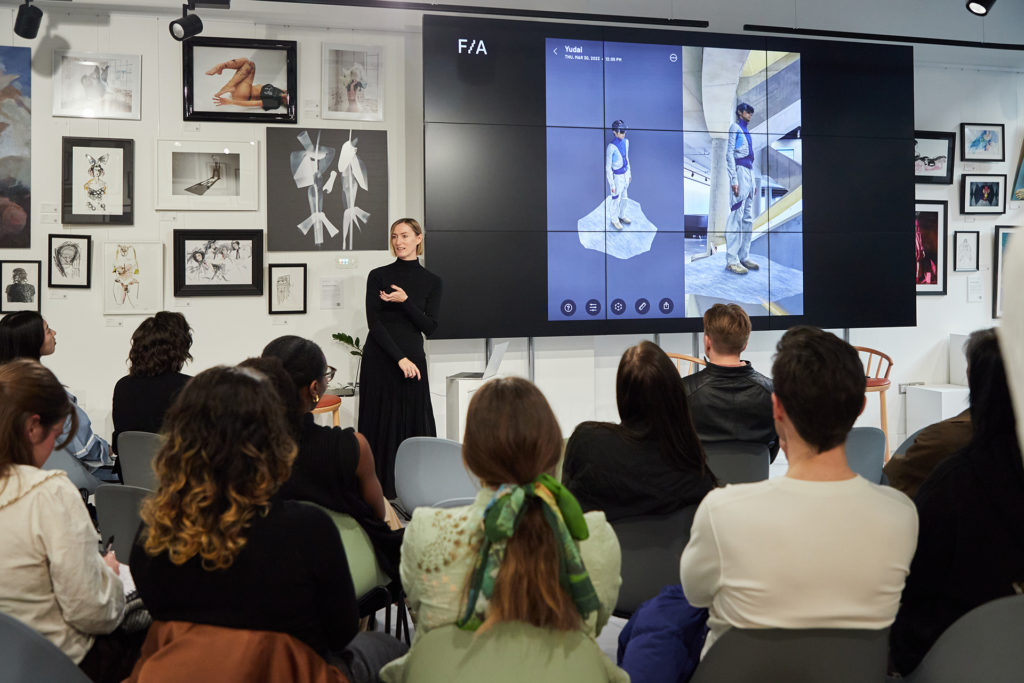
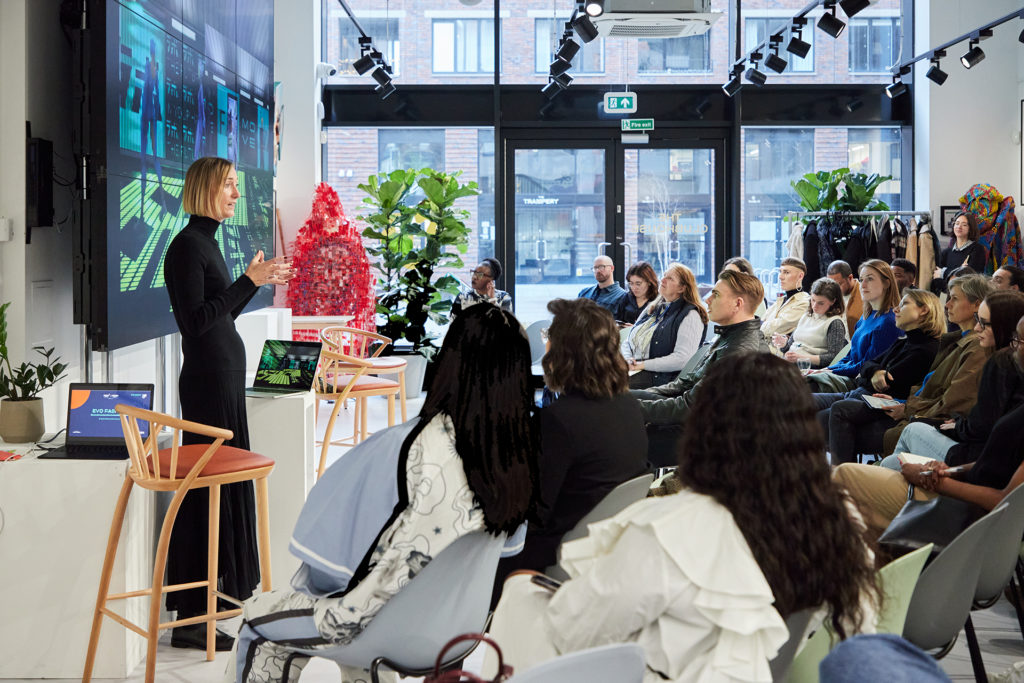
‘With digital fashion improving, exciting virtual experiences will be on the cards. This will lead to expansive fashion communication with potential for widespread impact. For example, moving beyond the walls of physical catwalk shows which are often limited to a certain number of people, designers can have real time AI generated catwalks which can be open to everyone.’
After her presentation, Lisa took questions from the audience. When asked to pick one area of technology that would be most useful for the future of the fashion industry, Lisa didn’t hesitate. ‘Generative AI is going to have the most impact,’ she told the audience. ‘As I’ve shown, it can be used as a creative tool and it can help behind the scenes. You can use it to be an expert consultant in a particular field, whereas previously you’d have to spend thousands of pounds to get that advice.’
‘I think people are nervous of AI because they don’t necessarily understand it and people think it will take their jobs. But at the same time, the genie’s out of the bottle now. If you don’t start getting your head around it and how you can deploy it within your business, you’ll get behind because everyone else will be catching up!’
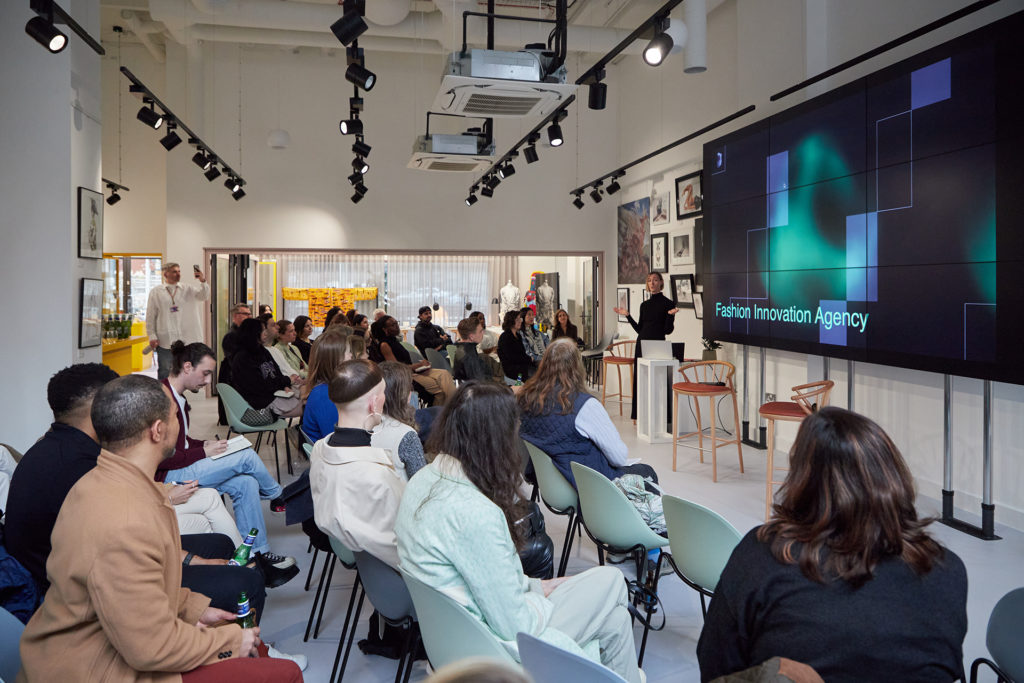
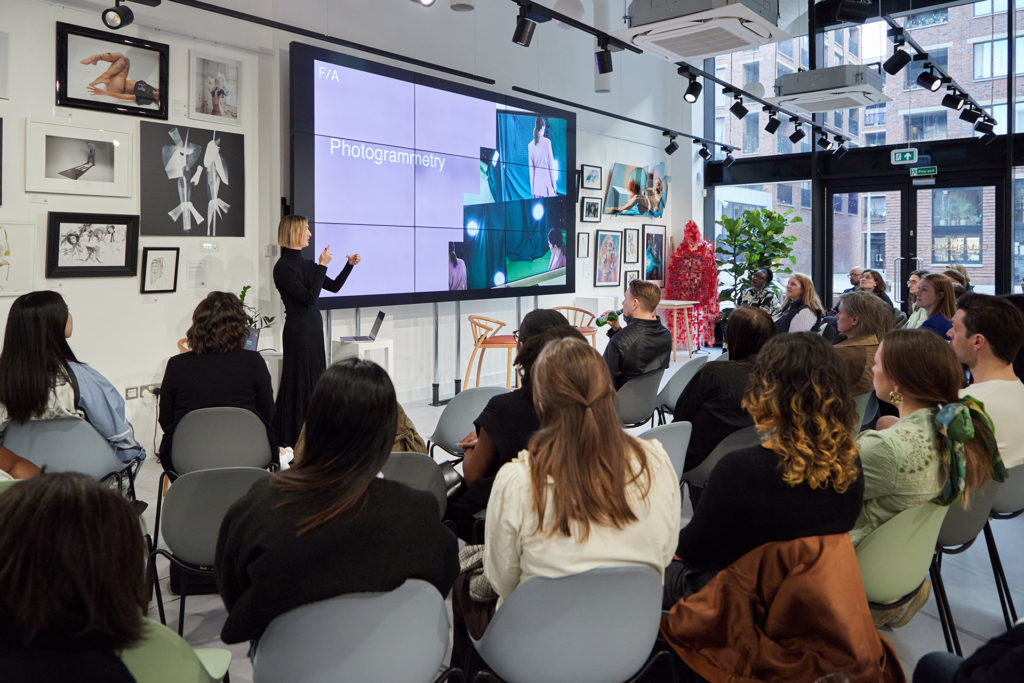
Phygital Fashion with Stephy Fung and Muchaneta Ten Napel
Next, Muchaneta Ten Napel, Founder of Shape Innovate, hosted a conversation with trailblazing digital artist Stephy Fung. Having just been included in Forbes 30 Under 30 list for Art and Culture, Stephy introduced herself by highlighting her USP: ‘digital first, physical second.’
Speaking about her background in graphic design, Stephy said, ‘I did not set out to become a fashion designer, but I took an interest in 3D and 3D animation. I have always naturally gravitated towards animation and storytelling. I think you can see that in my work. The clothes aren’t just garments. I like to put them in a scene and give them a ‘home.’ I love to tell a story.’
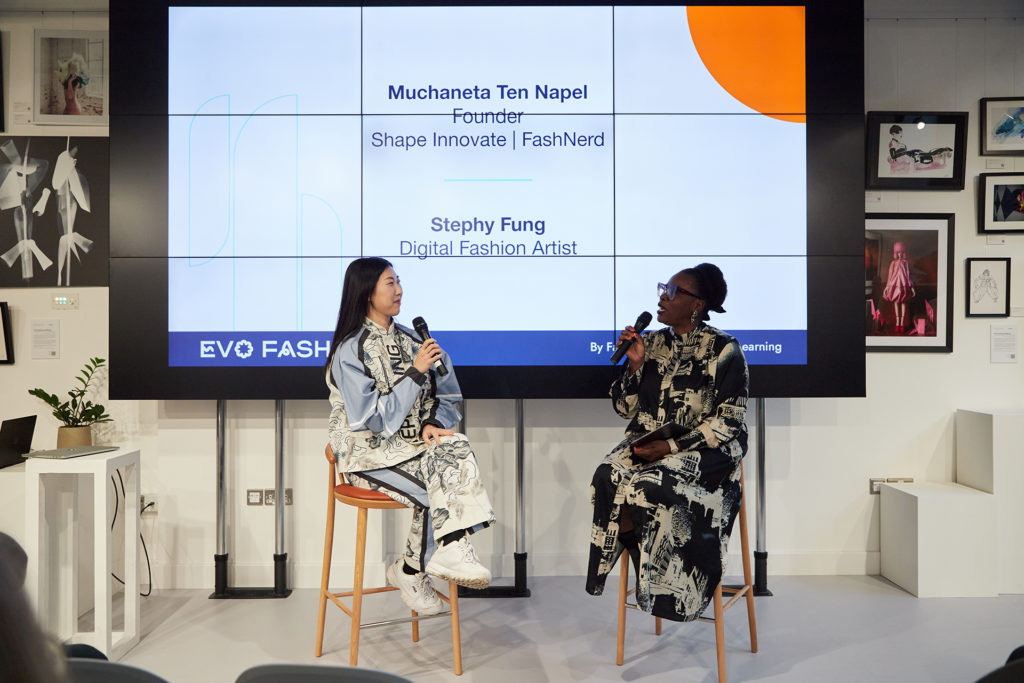
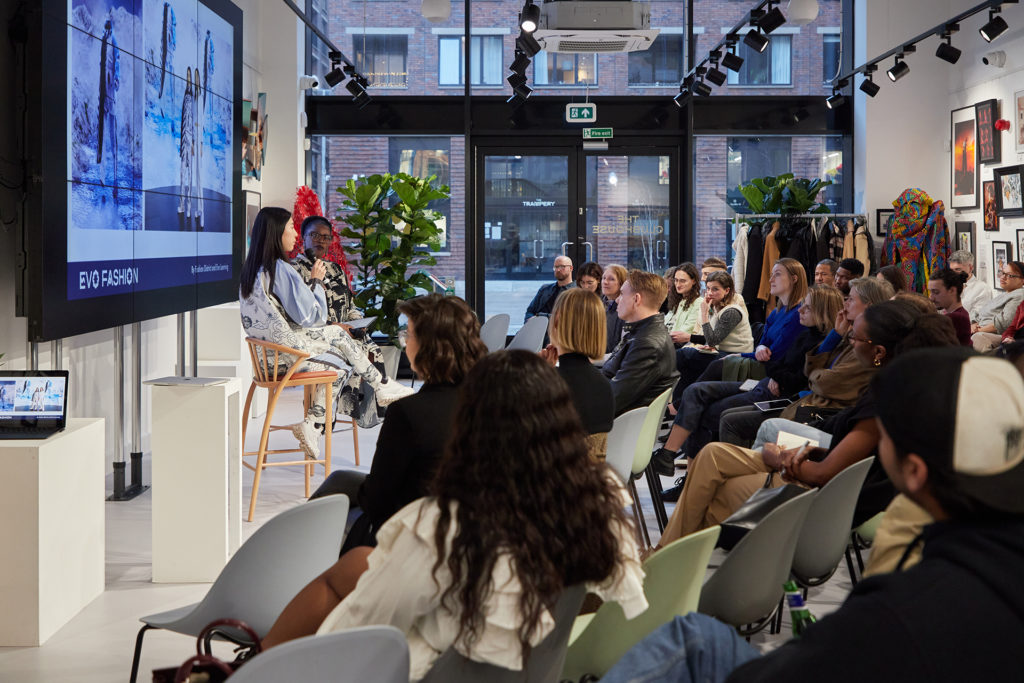
When asked by Muchaneta about challenges she’s faced in the industry, Stephy admitted she’s struggled with turning her 3D animations into physical designs. ‘I’m currently working with a company called Phygital Twin. They’ve got incredible fashion knowledge, from pattern-making to manufacturing connections. Because I don’t come from a fashion background, I need help to make my designs physical. The way I design on a programme might not necessarily work or be practical for physical production. That’s one thing that I’ve struggled with and I’ve had to learn along the way whilst working with Phygital Twin. Also, in my opinion, creating digital pieces will always be a lot cheaper compared to making physical ones, so that’s another challenge.’
In response to Muchaneta’s question about the link between digital fashion and sustainability, Stephy remarked, ‘I think a lot of brands will take on digital and replace some parts of their pipeline to speed up testing or use AI to conceptualise and visualise. Even with 3D avatars, you don’t need to get a model to come in, you can test online or change the cut, it’s a lot quicker and more efficient than the regular process.’
To wrap up the conversation, Muchaneta posed one last question. ‘What about companies who can’t afford to use digital technology, what would you recommend?’
‘There are a lot of free AI programmes out there that you can test out,’ answered Stephy. ‘Before you pay for anything, look for free programmes first and make sure to use all the free trials they offer!’
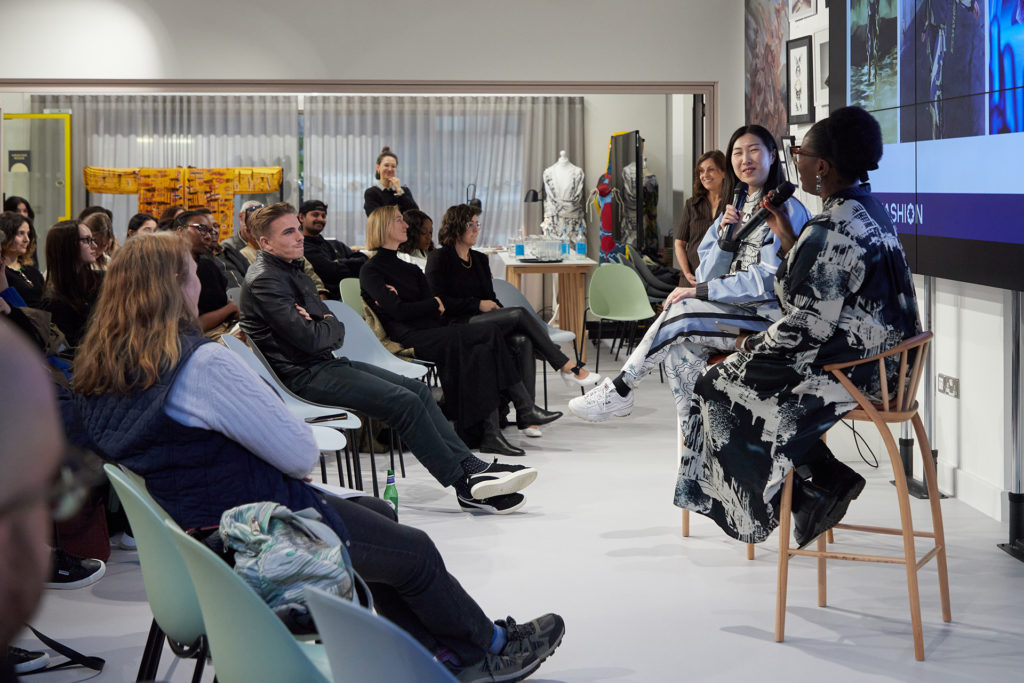
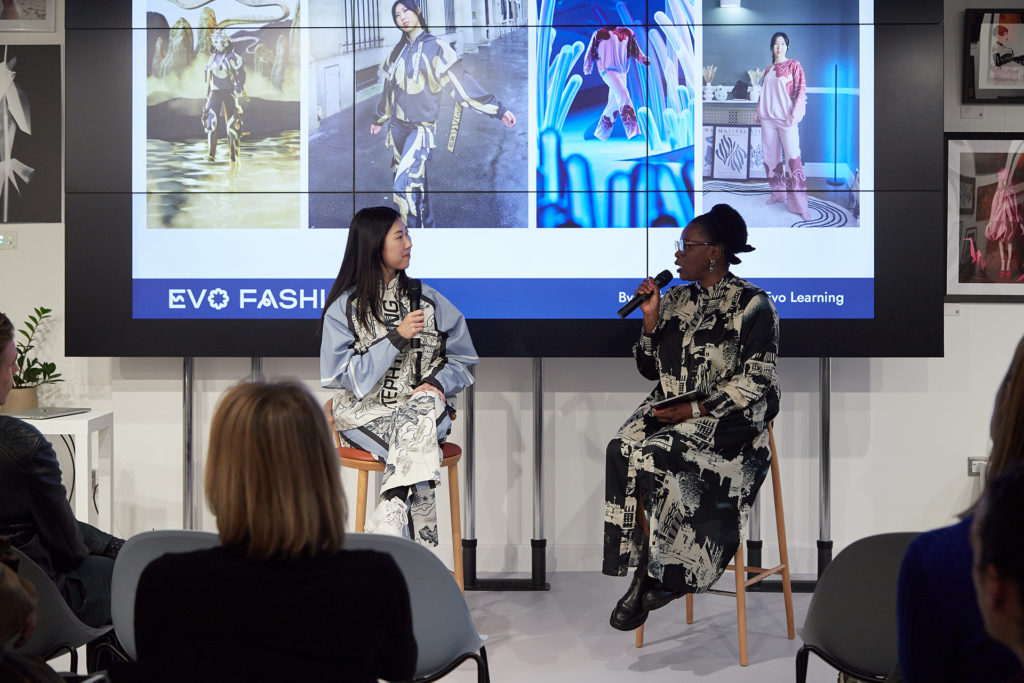
Manufacturing Tech with Shana Chu and Muchaneta Ten Napel
After a quick interval where attendees tucked into delectable canapes and grabbed a drink at the free bar, we were back for another conversation hosted by Muchaneta Ten Napel with Shana Chu, Founder of Tailr, who hopes to redefine garment production by using AI technology.
Having worked as a brand technologist for a number of years, Shana saw first-hand how disconnected brands were from their supply chains. ‘A lot of things get lost in translation,’ said Shana, ‘which is where I got the idea for my business.’
‘Essentially, we digitise the nuances of how the fabric is actually created. We get down to the yarn, the composition, the finishing, the spinning, the weaving, the make of the machine, the tension, the density of the yarn. We even look at where the yarn came from – for example, how was the cotton grown? How was the season? Are things consistent from last season? How is all of that going to affect production for the brand?’
‘Ultimately we aim to reduce waste by making sure nothing goes wrong. Did you know, on average, 20% of production comes in wrong for brands? That 20% is often shipped to landfill. Our goal is to remove that element and we will do that by ensuring that things are perfect at factory level.’
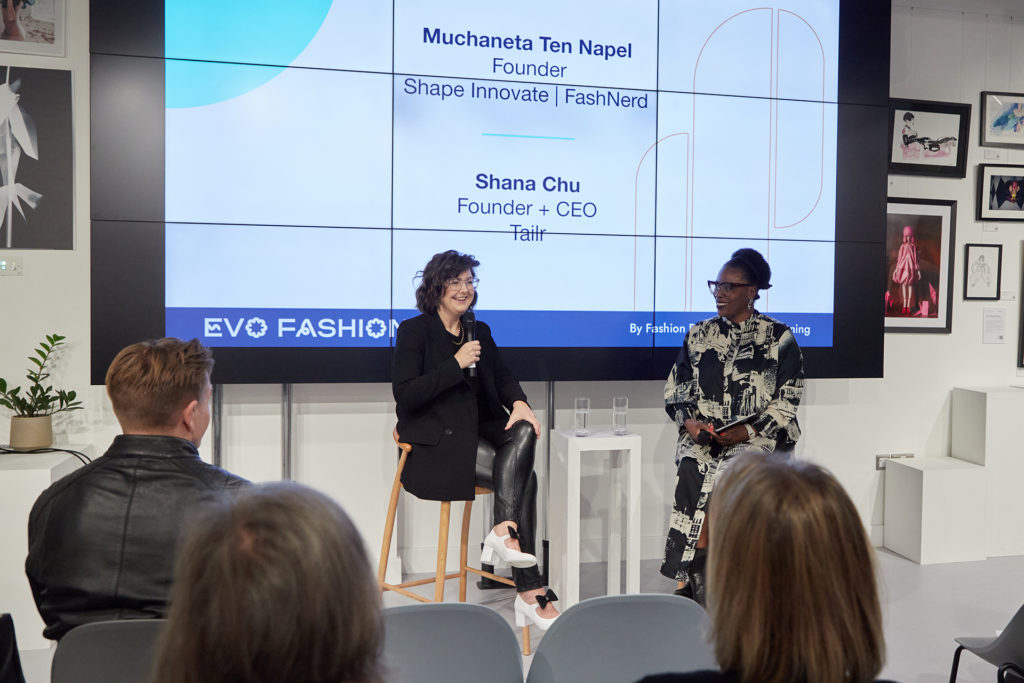
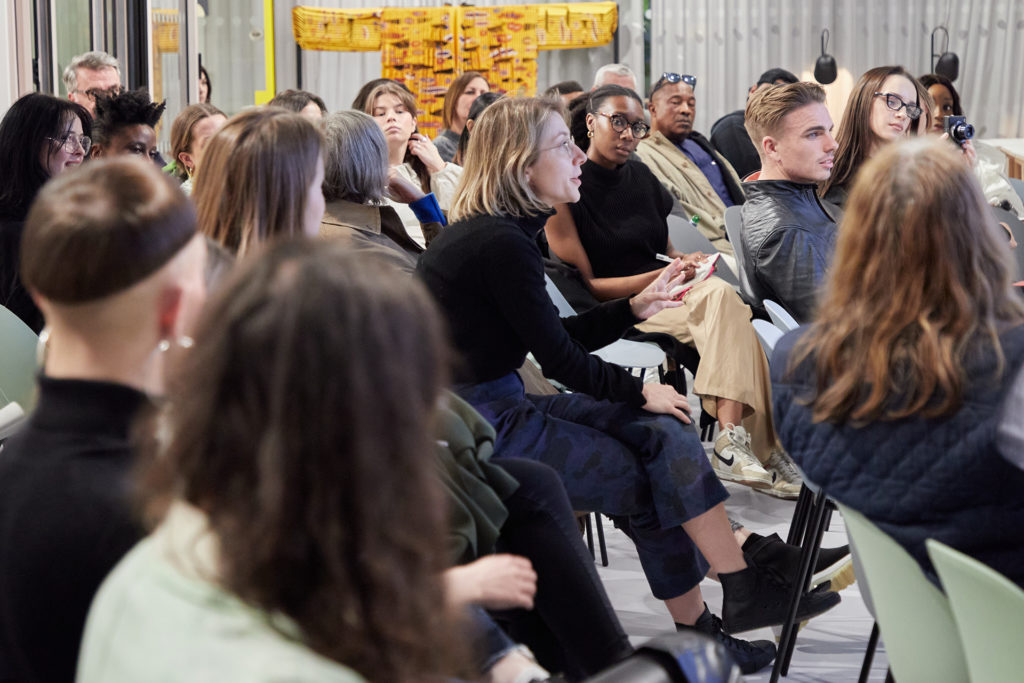
Offering advice for emerging brands and startups, Shana said, ‘Don’t be bullied when you know what’s best for your company. It’s important that you have the guts to say no, I don’t want to do it that way. When you’re starting out, you try to listen to all the advice people want to give you, but it can be overwhelming. Listen to what resonates with you.’
When asked by Muchaneta about emotional challenges she faced, such as imposter syndrome, Shana responded candidly, saying, ‘You know that saying ‘fake it til you make it’? It did help. Sometimes I do have to pretend that I’m super confident. But what I’ve learnt along the way is this: don’t be shy of your vision, don’t be afraid to be ambitious, and don’t be afraid to sell what you want. If AI has done anything, it’s shown us that those big visions are absolutely possible.’
From securing £700,000 as a sole female founder, to assembling a team of eight people and presently raising £5 million, Shana’s insight on funding was invaluable. ‘Before you get to the investor stage, try to take part in competitions. I won the best new startup company in Ireland and I got £50,000. I got that to build my MVP. You don’t necessarily need to go straight to investors to get funding. There are a lot of opportunities out there.’
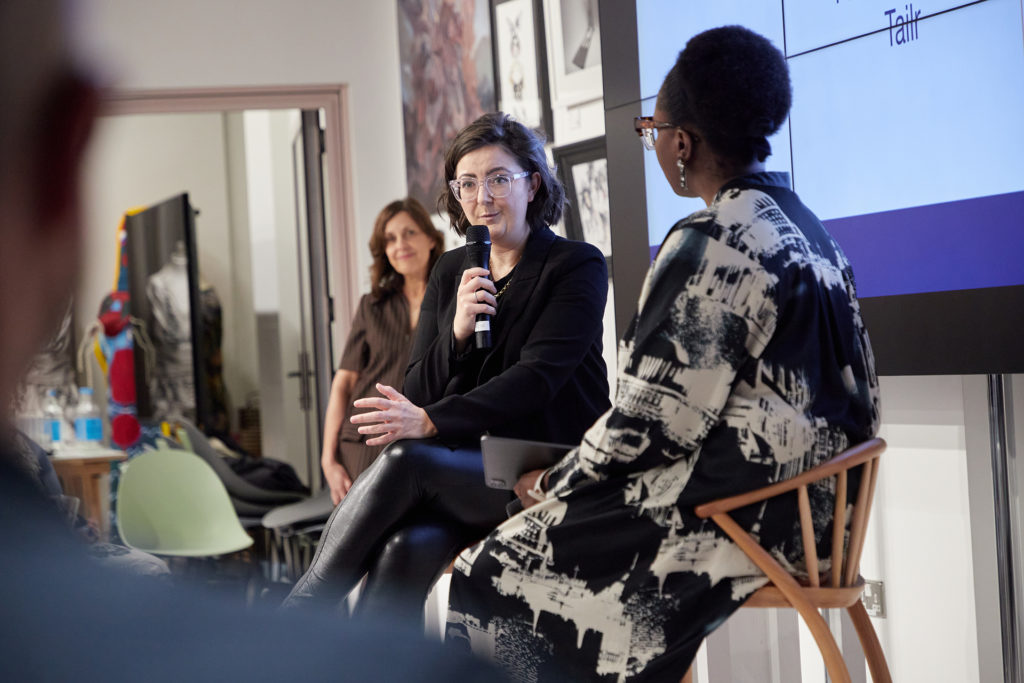
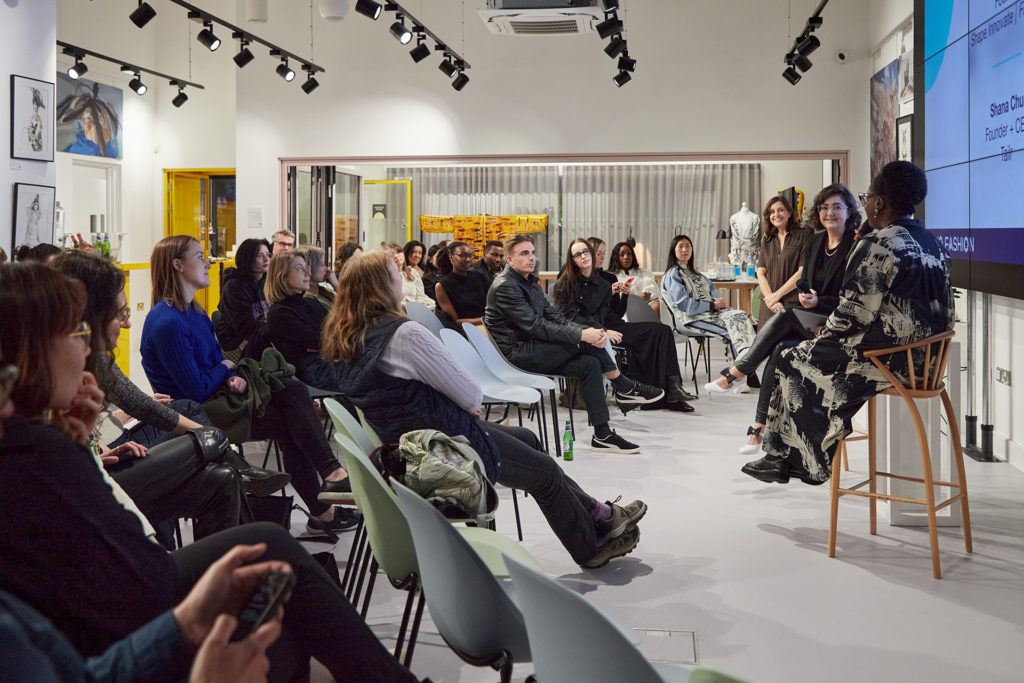
Introduction to Evo Fashion for Fashion Tech Businesses
To conclude the evening, Helen Lax, Director of Fashion District, took to the stage to present a comprehensive overview of the Evo Fashion programme.
Designed to fit in with work commitments and delivered by experts, the fully-funded five-month programme consists of a two-day intensive launchpad and four full-day masterclasses which will focus on different aspects of learning, including environmental and ethical practice, business and financial planning, marketing and storytelling, founder wellbeing, sustainable growth and much more.
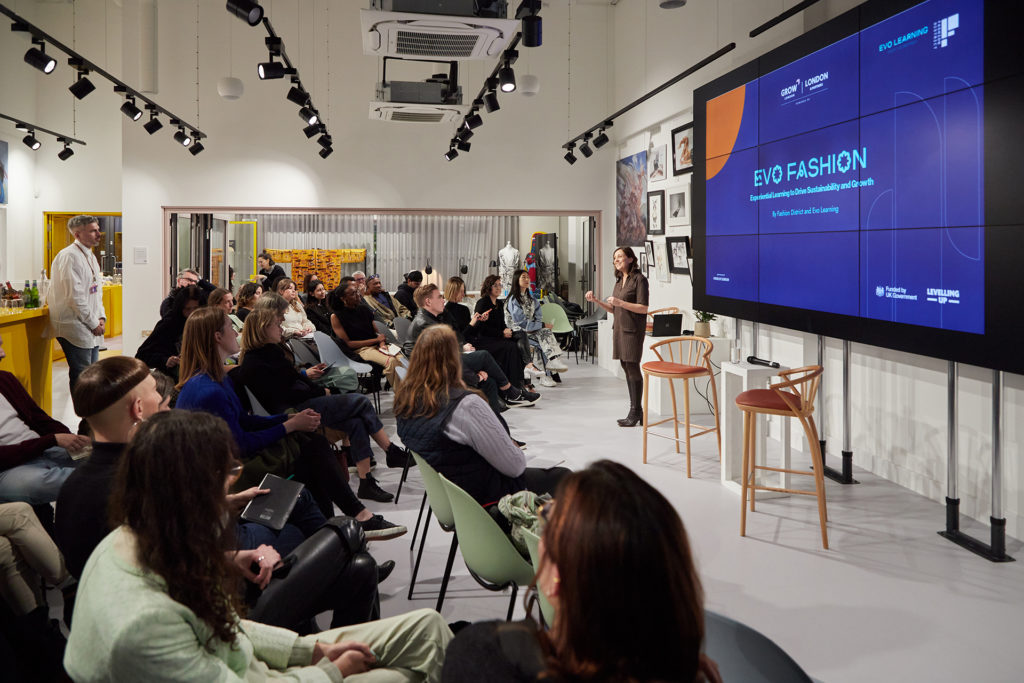
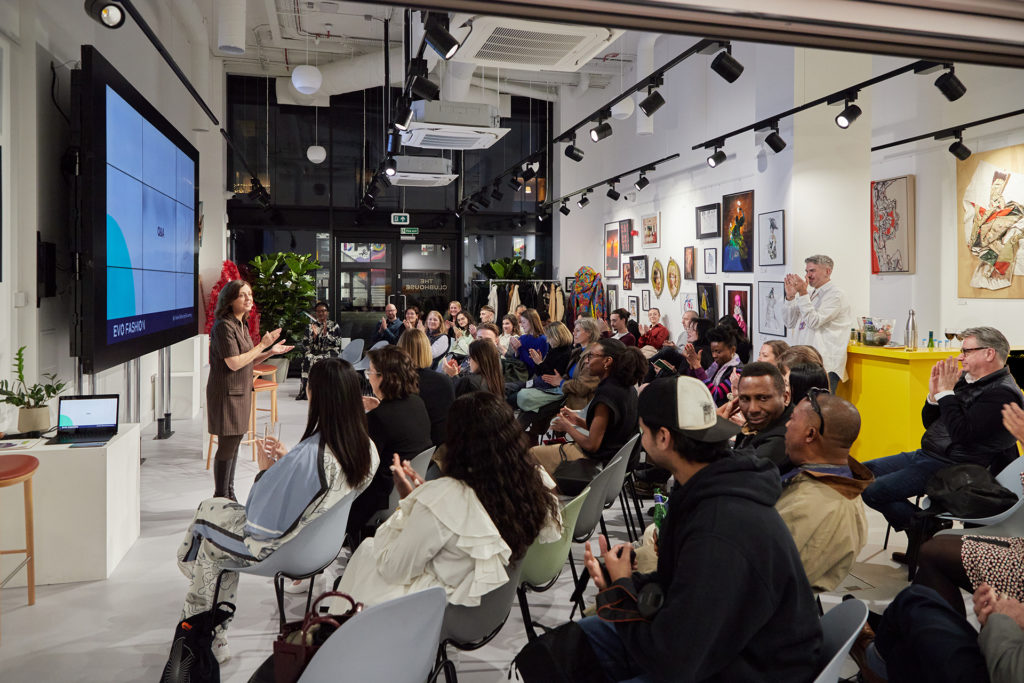
‘Peppered in amongst the sessions and masterclasses,’ Helen told the audience, ‘there will also be panels and talks, a 1-2-1 business diagnostic, three peer-to-peer learning workshops, a creative photoshoot, and the chance to present your brand at an industry showcase.’
‘To be eligible you must be a registered business based in London. You must employ 2-5 people and you must have been trading for 18 months,’ said Helen. ‘You must also have turnover or investment of a minimum of £50k in the last financial year. If you’re unsure about whether you’re eligible, please get in touch with the Fashion District team.’
With an incredible selection panel for the second cohort, including Brooke Roberts-Islam, Founder of Techstyler; Tom Adeyoola, Entrepreneur, Investor and Advisor; Lisa Chatterton, Business Manager, Fashion Innovation Agency; Charles Armstrong, CEO of The Trampery, and Helen Lax, Director of Fashion District, applications are now open and will close at midnight on 3rd June 2024.
Find out more and apply for the second round of Evo Fashion now via the button below.
Got a question? Please get in touch with us at fashion@evolearning.co with any queries about the programme, content, facilitators, application form, and eligibility.
Want to stay informed about the latest developments in the Evo Fashion programme? Subscribe to the Evo Fashion newsletter:

Evo Fashion: Cohort One Announced!
As we anticipate the arrival of Spring, we’re gearing up for new opportunities, and one that we’re most looking forward to at Fashion District is our Evo Fashion Programme.
This comprehensive five-month experiential programme caters to emerging brands and fashion technology ventures. After calling for applications throughout December and January, we’re now thrilled to unveil the first businesses selected for the programme.
What is Evo Fashion?
With a holistic approach to business strategy, the Evo Fashion programme focuses on supply chain sustainability, ethical working standards, market channels, and investment readiness. Activities include a two-day intensive launchpad, masterclasses, and peer-to-peer learning, designed to accommodate work commitments and culminate in an industry showcase. Co-delivered by Fashion District and Evo Learning, Evo Fashion will run twice, with the first programme tailored for emerging designers and fashion brands, and the second programme spotlighting fashion technology businesses.
Evo Fashion is part of the Grow London Early Stage programme, powered by London & Partners – a business support programme for early-stage growth companies active in high growth sectors that support sustainable and inclusive growth in London. The programme is funded by the UK Government through the UK Shared Prosperity Fund.
Meet the Selection Panel
With an esteemed selection panel of industry leaders, including Helen Lax, Director of Fashion District; Charles Armstrong, Founder and CEO of Evo Learning and The Trampery; Vanessa Podmore, Founder of Podmore Consulting; Bianca Saunders, Founder, Creative Director, and Designer of Bianca Saunders; and Yvie Hutton, Director of Designer Relations & Membership at the British Fashion Council, each member was strategically chosen for their unique expertise.
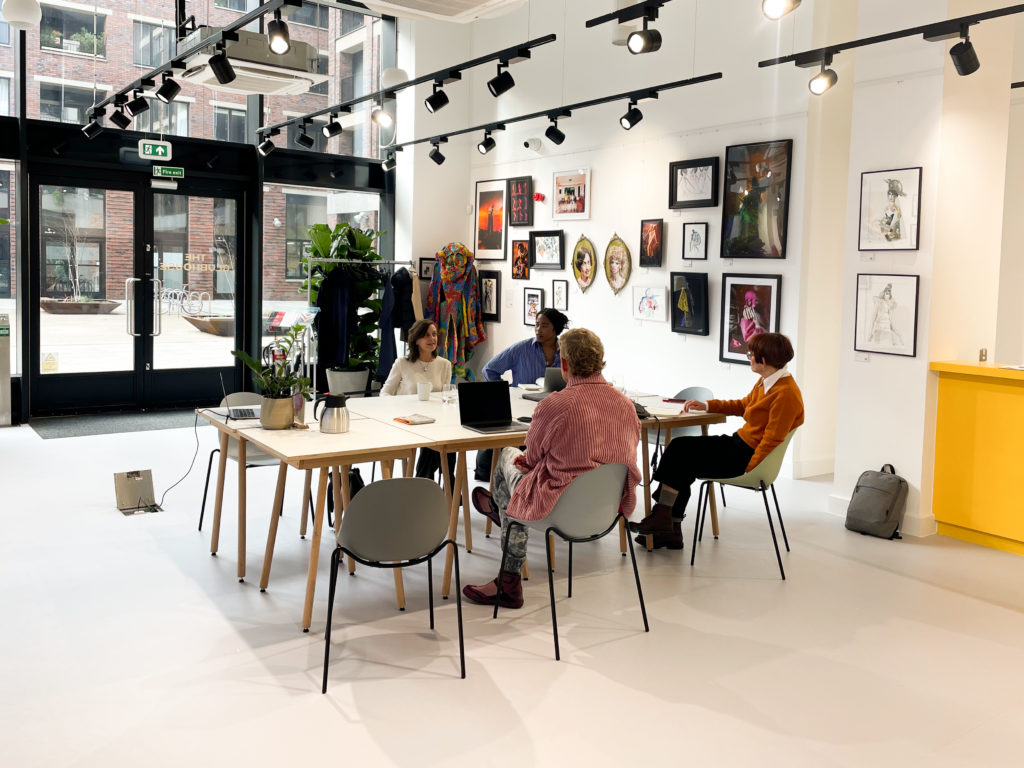
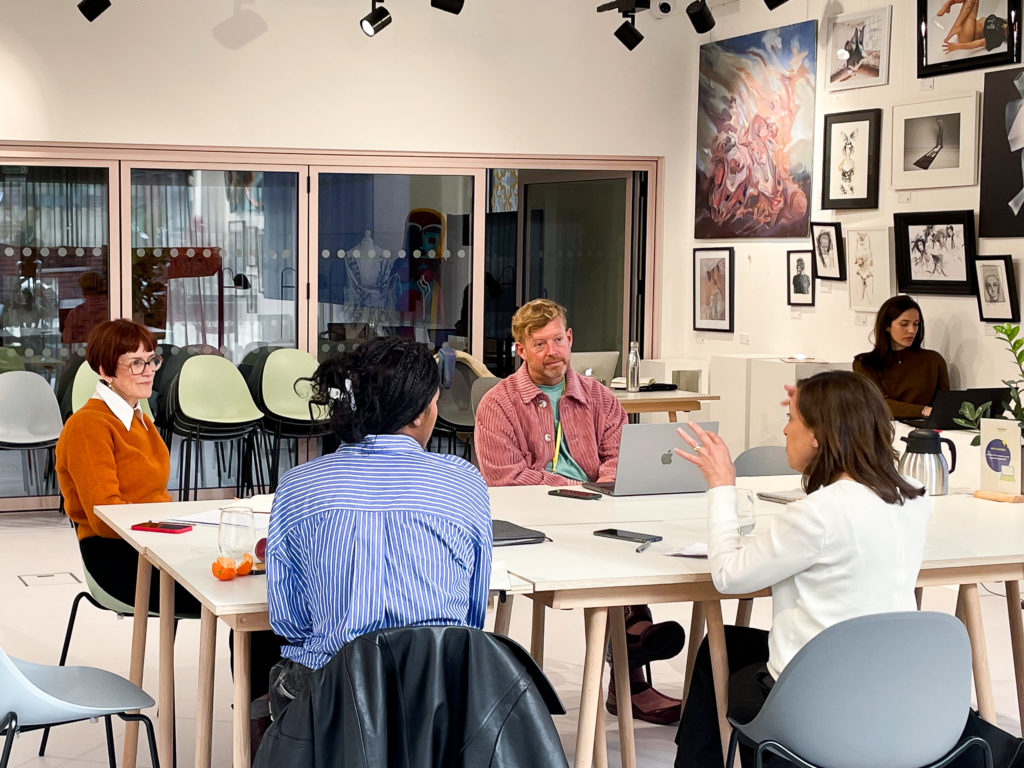
Bianca brings invaluable experience in fashion brand development, while Yvie has a rich background in nurturing emerging designers within the BFC community. Vanessa’s expertise lies in fashion sustainability. Together, the panel’s collective insight enabled them to assess applicants’ potential for business success and their commitment to integrating sustainability into their ventures.
The panel convened at The Trampery Fish Island Village in early February to meticulously review each submission, individually score the applications, and select the inaugural cohort of successful businesses for the programme.
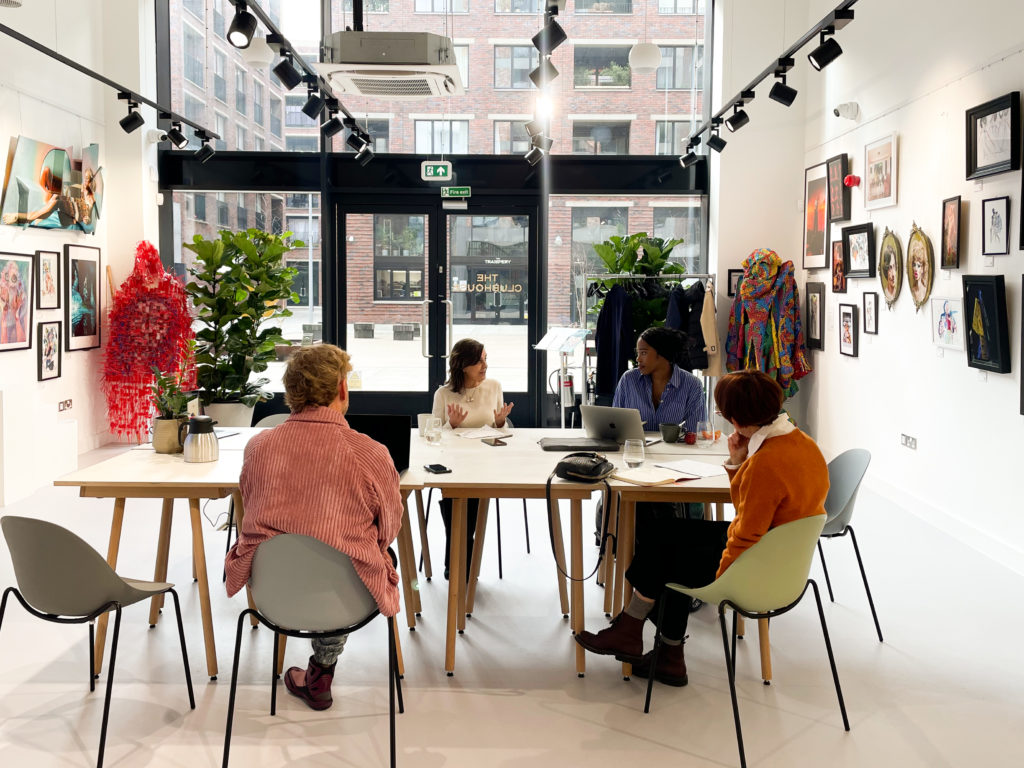
Introducing the Inaugural Cohort
After much deliberation, here are the sixteen businesses selected for the first Evo Fashion programme:
ANCIELA
ANCIELA is a London-based sustainable luxury womenswear label that blends South American folklore with an outsider’s perspective living in London, offering experimental tailoring and Ready-To-Wear pieces inspired by art, literature and historical costumes. Committed to sustainability, the brand champions hand-crafted designs and supports Latinx creatives, showcasing cultural diversity through fashion.
Asmuss
Asmuss, founded by sisters Clare and Fiona, crafts ethically and environmentally responsible garments for the modern active woman, blending innovation and nature to design versatile, sustainable pieces. Committed to inclusivity and ethical production, Asmuss offers technically intelligent, renewable fabrics and season-less silhouettes, all made in the UK by social enterprise Making for Change or co-founder Clare, ensuring kindness to both body and planet.
BEEN LONDON
Hailed as ‘one of the most innovative fashion brands in the world’ by British Vogue, BEEN LONDON creates versatile, timeless accessories from discarded materials, challenging fashion sustainability norms. Founded by ex-BBC journalist Genia Mineeva in 2018, the brand’s mission is to divert waste from landfill, crafting beautiful, high-quality products with minimal environmental footprint.
Clara Chu
Clara Chu, founded by London-based multidisciplinary artist and designer Clara Chu, specialises in redefining fashion accessories. Through a unique blend of everyday mundanity and vibrant pop art, the brand transforms overlooked items like mops, toasters, and toothbrushes into wearable accessories. Merging mass production with hand-craftsmanship, Clara’s visionary products challenge conventional fashion norms, blurring boundaries between high and low culture while highlighting the importance of community involvement in creating a sustainable fashion ecosystem.
Colèchi
Colèchi is a research and events agency dedicated to advancing sustainable development in the fashion industry by working to humanise clothing through curation, workshops, and insight. Collaborating with a collective spanning growers, weavers, designers, and recyclers, they deliver research projects, curate events, and are currently expanding their product range, which includes their debut print journal AGREENCULTURE and a forthcoming capsule collection featuring UK alpaca wool.
Everyday Phenomenal
Everyday Phenomenal is a sustainable womenswear brand based in London that harmonises style and comfort with the ethos of wellbeing and mindfulness. Their collections feature essential wardrobe staples crafted with quality, accessibility, and empowerment in mind, inviting women to embrace their best selves. Each garment is paired with a QR code linked to their wellness hub, “THE CIRCLE OF FEELING GOOD,” promoting mindfulness and holistic wellness.
Fashion Meets Music
Fashion Meets Music is a community interest company led by Lizzy Lambie and Dennica Abdo, based in the Croydon Creatives zone, that transforms unused spaces into vibrant retail and event experiences. They fuse runway shows, live music acts, art, pop-up vendors, and networking to engage underrepresented communities in enterprise, education, and employment while offering end-to-end guidance and support for individuals or brands aiming to elevate their ideas and dreams.
Isla de Gar
Isla de Gar is a slow fashion handbag brand founded in 2020 by award-winning designer Emma Garner that infuses joy, togetherness, warmth, and humanity into its sculptural, tactile creations. Handmade to order in their London studio, each piece is inspired by the natural world and invites wearers to a realm where art is wearable and happiness knows no bounds.
Kyle Ho
Kyle Ho is a luxury menswear brand dedicated to elevating traditional tailoring through intricate details and a revolutionary design philosophy, with an eco-conscious, made-to-order business model. Operating on a pre-order system, each custom-made item significantly reduces environmental impact and resource usage, while sourcing materials from local UK vendors supports local merchants while reducing the carbon footprint.
Mirla Beane
Mirla Beane is an ethical brand offering inclusive prices and sizing, supporting the next generation of designers while delivering sophisticated yet fun, sustainable designs with bold prints and pops of colour. Named after their children and grandchildren, each piece is made with care, ensuring uniqueness and kindness to the planet through small production runs and attention to sustainable and ethical accreditation of fabrics and makers.
NEW STANDARD
NEW STANDARD footwear embodies sustainability as the standard, drawing inspiration from Joe Strummer’s ethos of rejecting substandard quality for a better world. With a focus on longevity, high quality, and timeless design, each pair is crafted using non-plastic materials and durable construction techniques, ensuring minimal environmental impact and a timeless aesthetic that complements any capsule wardrobe. Situated in Hackney, London’s historical shoe-making hub, their expertise, honed through designing for renowned figures and legends in various fields, ensures a deep understanding of footwear craftsmanship.
OMNISS
OMNISS, an ethical fashion and lifestyle brand rooted in character-driven storytelling, is based at the heart of London’s Fashion District in Hackney Wick. Founded by Asya Ter-Hovakimyan and Francisco Zhou, their commitment to transparency in the supply chain and collaboration with women-led small enterprises in Armenia honours craftsmanship while creating products that transcend conventional demographics, designed for dreamers, zeitgeists, and visionaries. The brand has earned recognition at London Fashion Week and in notable publications like Forbes and Drapers.
Percy Langley
Percy Langley offers beautiful clothing for real women from a collective of independent designers championing the slow fashion movement, showcasing seasonal edits that embody a modern British aesthetic with investment pieces designed to endure and British-made garments renowned for superior quality. With a focus on sustainability and conscientious consumerism, they empower customers to make informed and responsible buying decisions while supporting designers dedicated to slowing down clothing production and prioritising eco-conscious practices.
Pomi and Seeds
Pomi and Seeds revolutionises lingerie by offering sustainably made, inclusive, and empowering solutions for women using design thinking, technology, and circularity approaches. Recognising the dissatisfaction with conventional offerings, Pomi and Seeds meets this demand with a diverse product line, featuring lingerie made from sustainable fibres and catering to cup sizes DD+ and up to size 24. Beyond comfortable and ethical lingerie, they prioritise diversity, inclusion, and global initiatives that empower women and promote social impact, envisioning a transformative future for the industry.
ZERØ London
ZERØ London creates quality menswear using innovative zero waste design techniques, reducing fabric waste by up to 15% compared to traditional methods and aligning with the UK’s commitment to carbon neutrality by 2050. Motivated by the 60 billion square metres of fabric wasted through the cutting process annually, the brand is on a mission to end fashion waste. Their products are internationally available and proudly crafted in London, employing a local supply chain to ensure accountability and minimal carbon impact.
Want to stay informed about the latest developments in the Evo Fashion programme? Subscribe to the Evo Fashion newsletter:

Inside the Launch of Manufacturing Futures 2024
Last week we celebrated the launch of Manufacturing Futures 2024 at a sold-out event at The Trampery.
Marking Fashion District’s sixth innovation challenge, this year the focus is on technological innovations and sustainable solutions that are solving any of the complex fashion manufacturing challenges facing the industry. Helen Lax, Director of Fashion District, described the event as a gathering of individuals that share ‘the same ethos, values and ideas for the future of fashion and sustainability.’
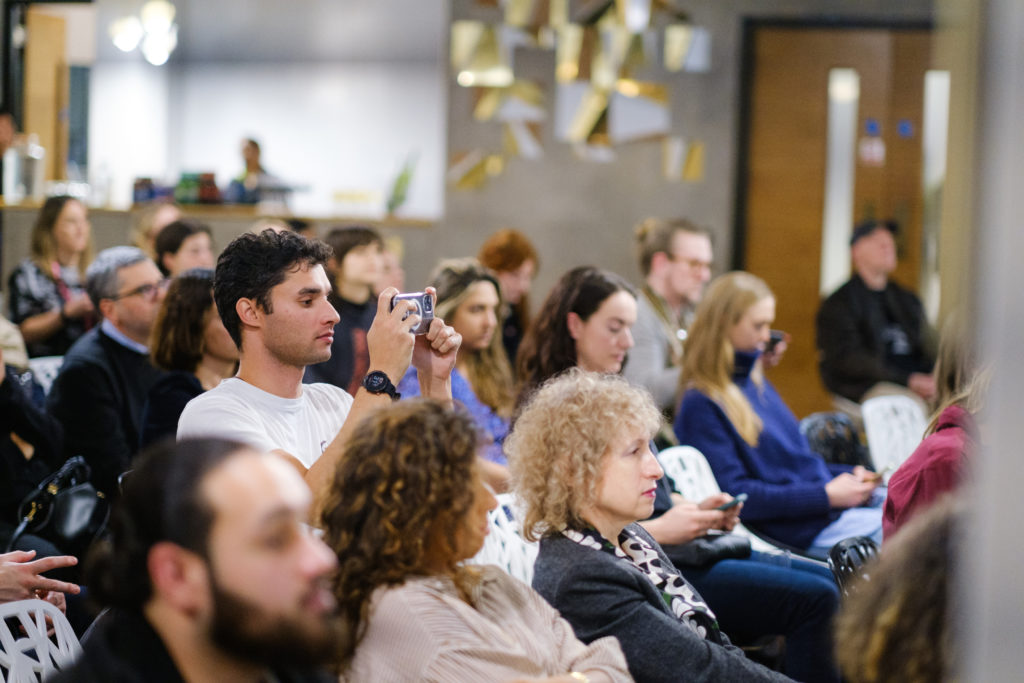
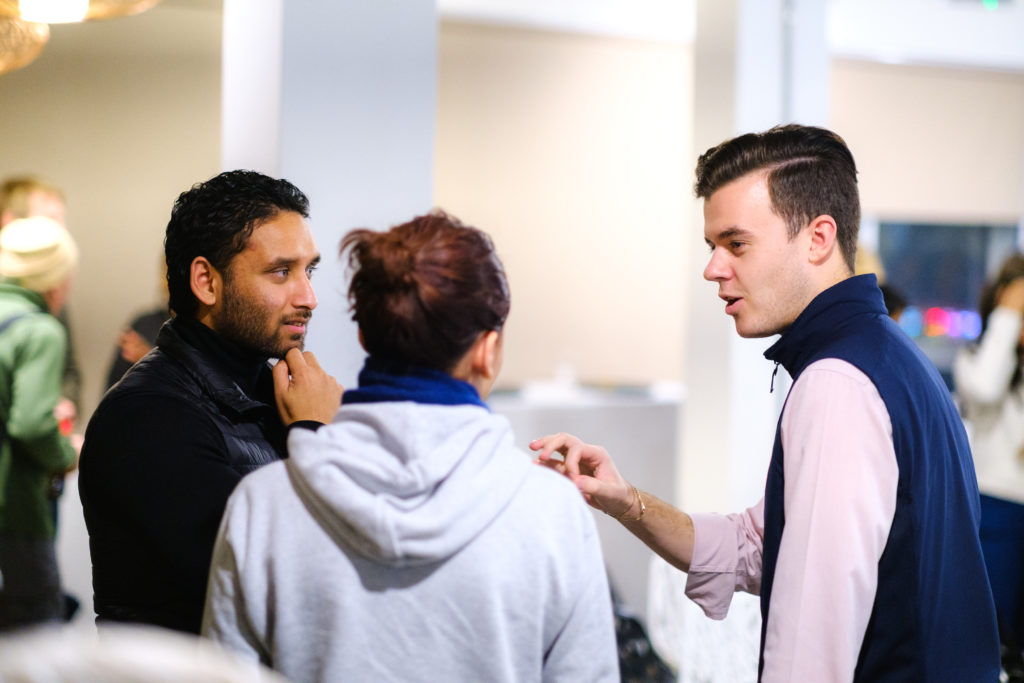
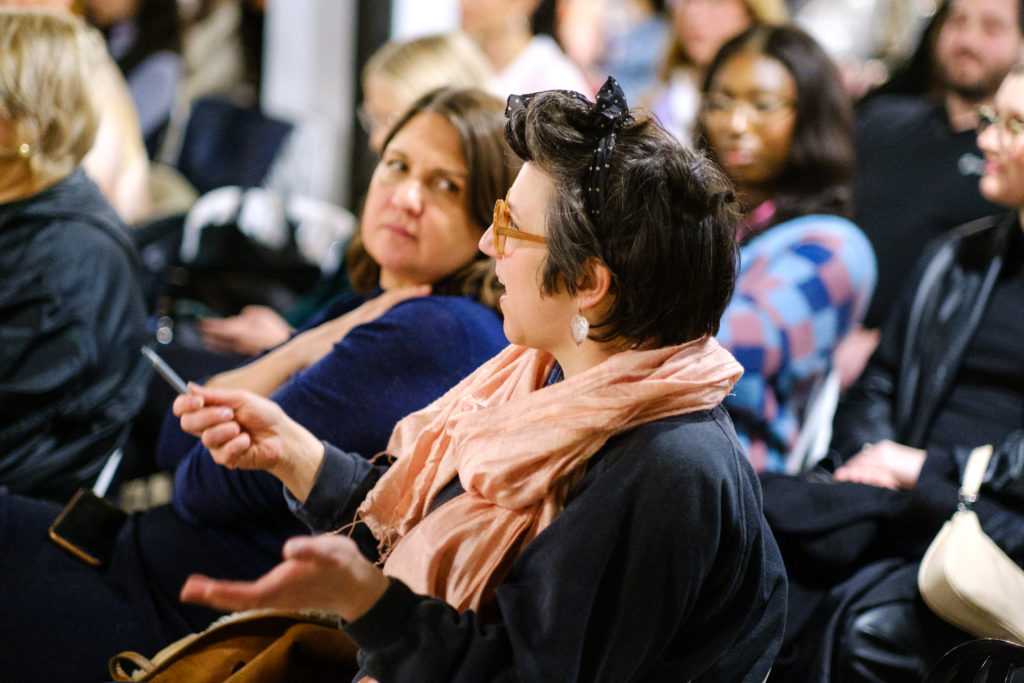
GANNI: Fabrics of the Future
Kicking off the event was keynote speaker Lauren Bartley, Chief Sustainability Officer at GANNI, who gave insight into GANNI’s strategy and how they work with innovation. ‘GANNI has a very very ambitious goal to reduce its carbon emissions by 50% by 2027,’ Lauren said. ‘The materials we use account for 50% of our carbon impact, making this our primary window of opportunity. It’s also where Ganni should focus as materials represent one of our most significant decarbonisation levers.’
Lauren also highlighted GANNI’s Fabrics of the Future initiative. ‘Fabrics of the Future is an internal research and development hub that scans the market for fabrics that will change the industry. At this point we’re working with thirty different material creators that have solutions or new innovations for materials. By 2025 the goal is that 10% of our materials should be coming from fabrics of the future.’
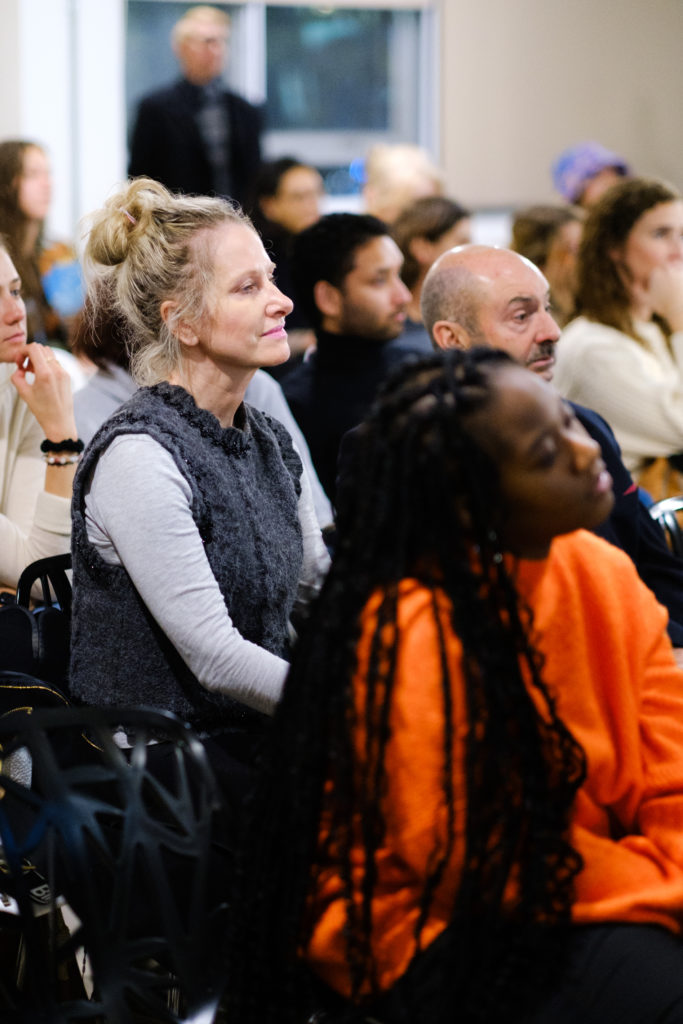
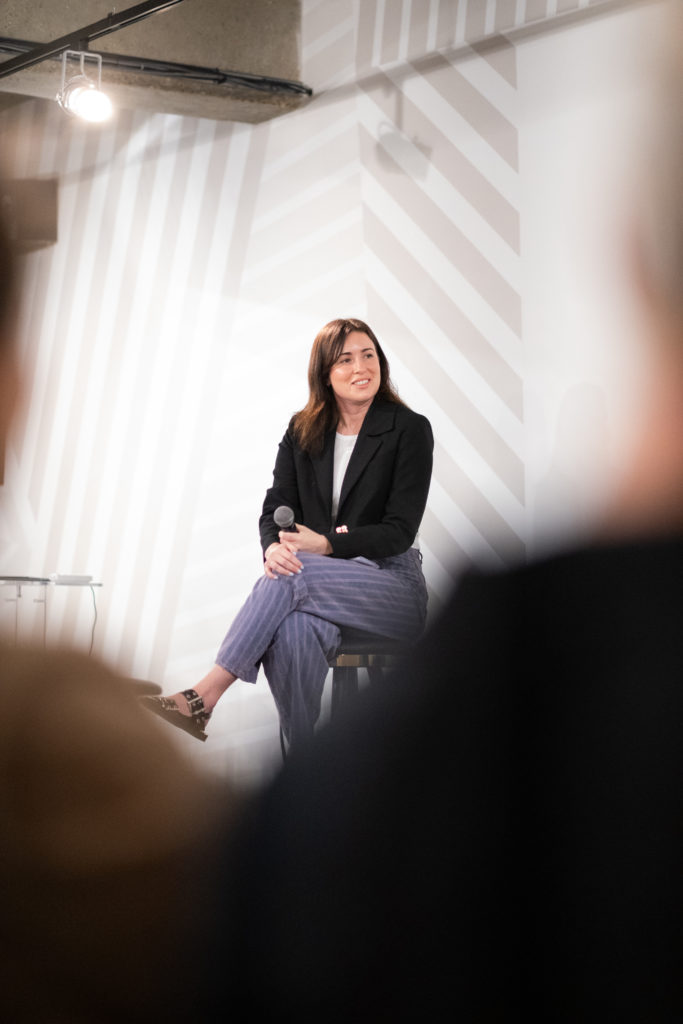
The Need for Partnership: Modern Synthesis x GANNI
One of the material creators GANNI have collaborated with is London-based biotech company Modern Synthesis. Lauren invited Jen Keane, CEO of Modern Synthesis, on stage to discuss their recent partnership.
Having developed a new class of biomaterials, Modern Synthesis works with bacteria to produce a type of non-woven textile that can be used to displace materials like leather, and in the future replace a wide variety of coated textiles. Modern Synthesis partnered with GANNI to reimagine their staple Bou Bag in their new innovative bacterial nanocellulose material. The handbag was unveiled at the London Design Festival 2023.
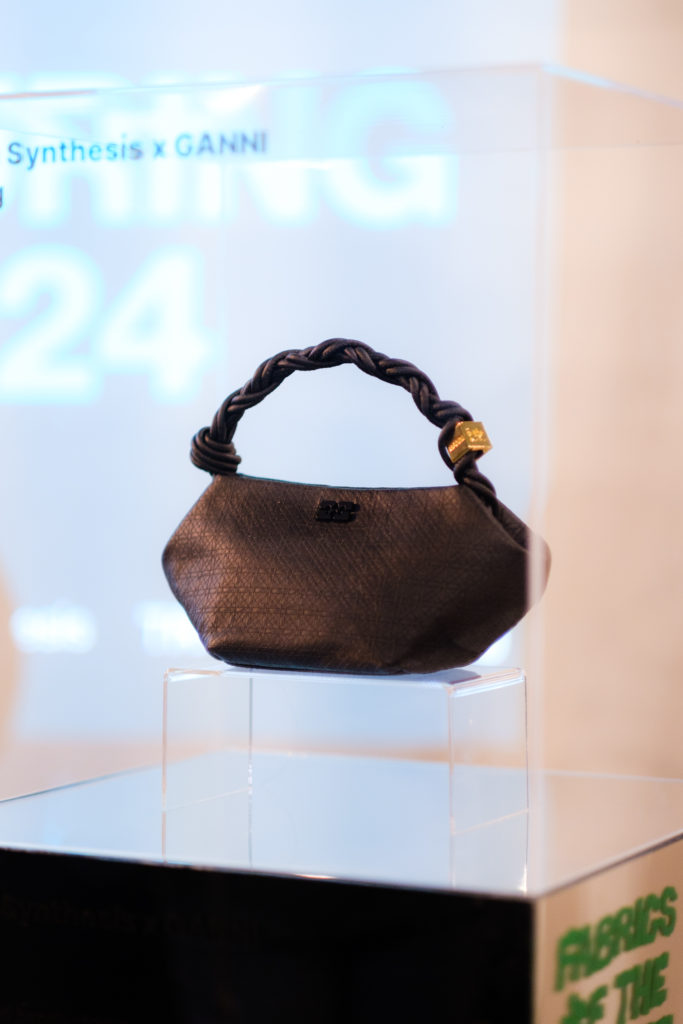
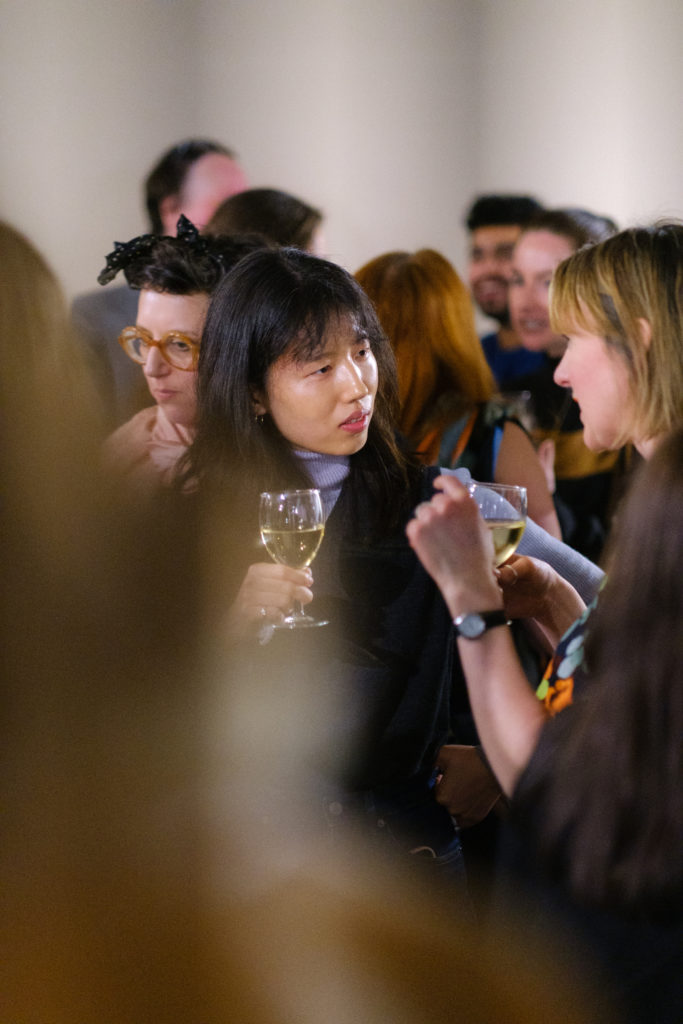
Explaining why Modern Synthesis reached out to GANNI to propose a potential collaboration, Jen said, ‘As a startup that makes materials, we can’t do it all. We need to actually make the impact that we want to drive and so we have to get it into a product. We need brands and partners across the whole supply chain to make that possible. We contacted GANNI because they have such a strong perspective in this space and actually take action. Very few brands have innovation departments.’
Lauren rounded up the conversation by saying: ‘I hope that what you’ll take away from our talk today is that GANNI relies heavily on innovations like Modern Synthesis to meet our sustainability goals, and vice versa. Jen needs brands like GANNI to secure investment and effectively implement these technologies. It’s important not to underestimate the value of partnership.’’
Offering one final tip to the audience Jen said, ‘Don’t give up! It’s hard but we’re gonna get there. My biggest advice is to collaborate as much as possible. You can’t do everything yourself. Figure out what you’re good at, what you’re not good at, and find friends to do the things you’re not good at.’
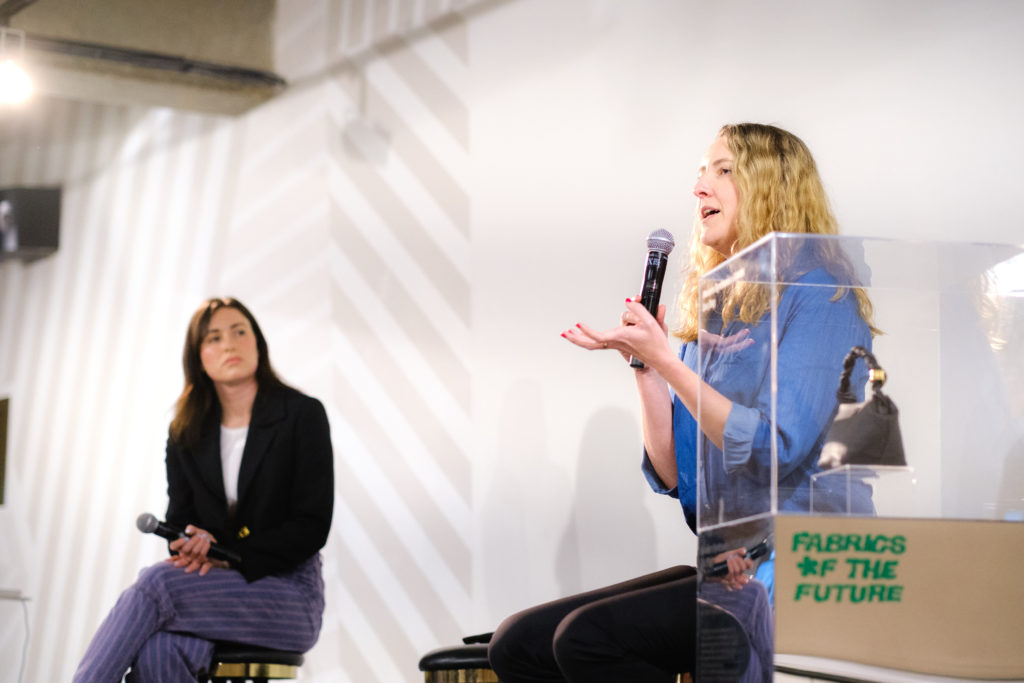
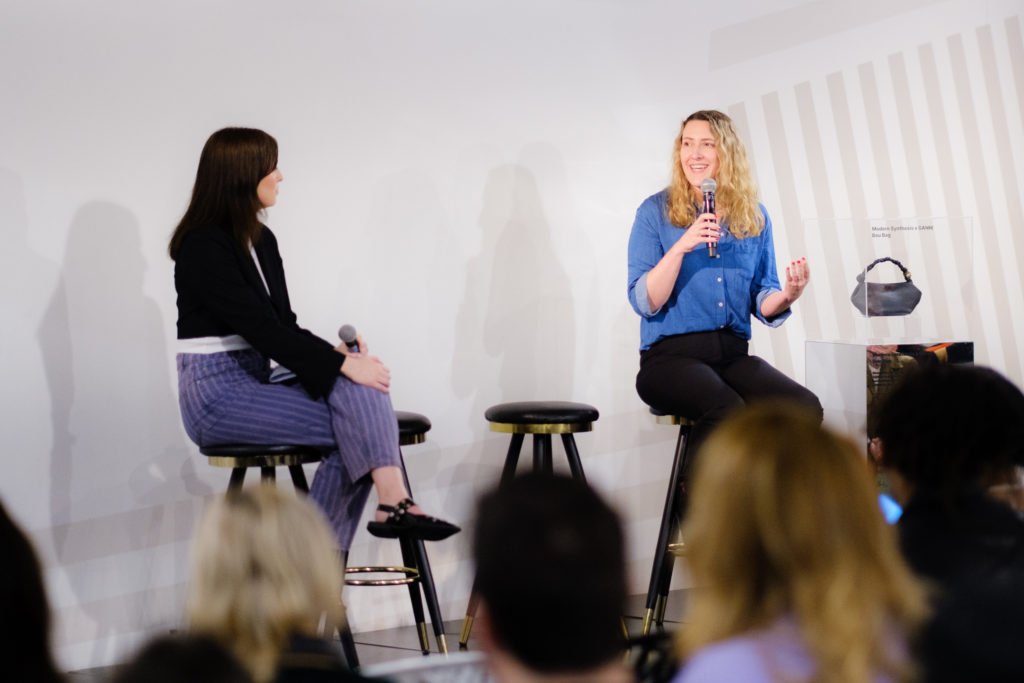
Introduction to Manufacturing Futures 2024
Helen Lax then took to the stage to introduce this year’s innovation challenge, Manufacturing Futures 2024. ‘This year, we’re seeking innovative ideas, businesses, and startups that can benefit the fashion industry by offering sustainable solutions for various aspects of the supply chain.’
To be eligible for the challenge, applicants must have a tech-based solution, be a registered business, and either be operating in the UK or have plans to pilot or operate in the UK. The winner will take home £15,000, as well as receiving business support from PANGAIA, one-year complimentary UKFT membership, one-year workspace membership at The Trampery and one-year platform membership from Common Objective. The runners-up will receive £5,000 each, one-year UKFT membership and one-year platform membership from Common Objective.
Finalists will attend a one-day event in May where high-level industry professionals will act as ‘critical friends’ to support and challenge their business proposition, and provide constructive feedback; as well as two Development Days focused around production and investment. Finalists will also be invited to join the celebratory Fashion District Innovation Awards and Investment Supper in July, attended by influential members of the fashion, tech and investment industry.
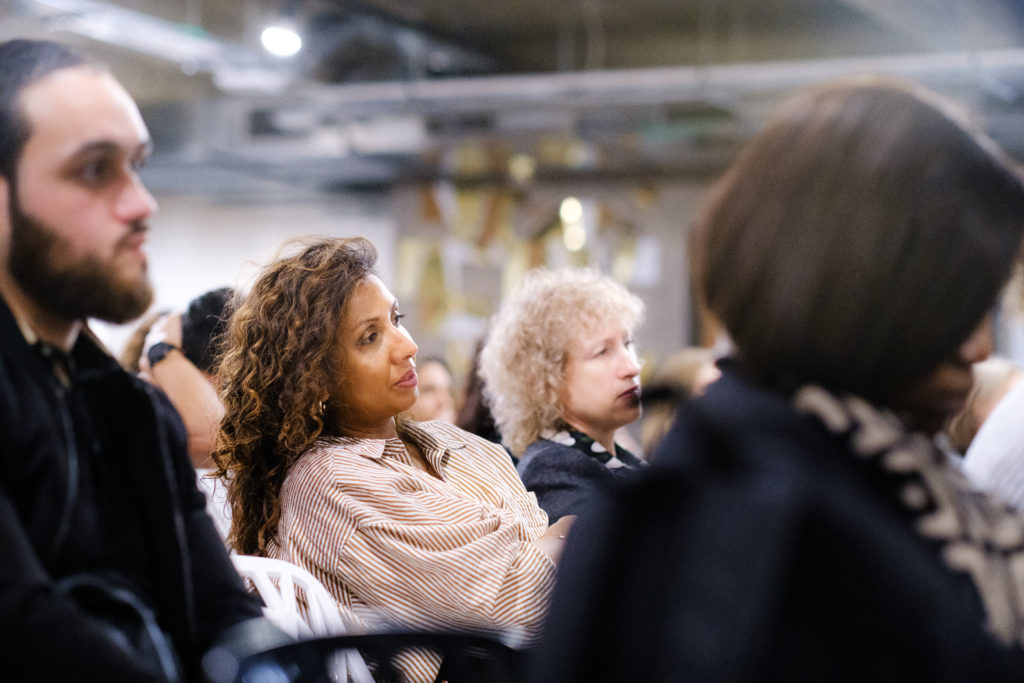
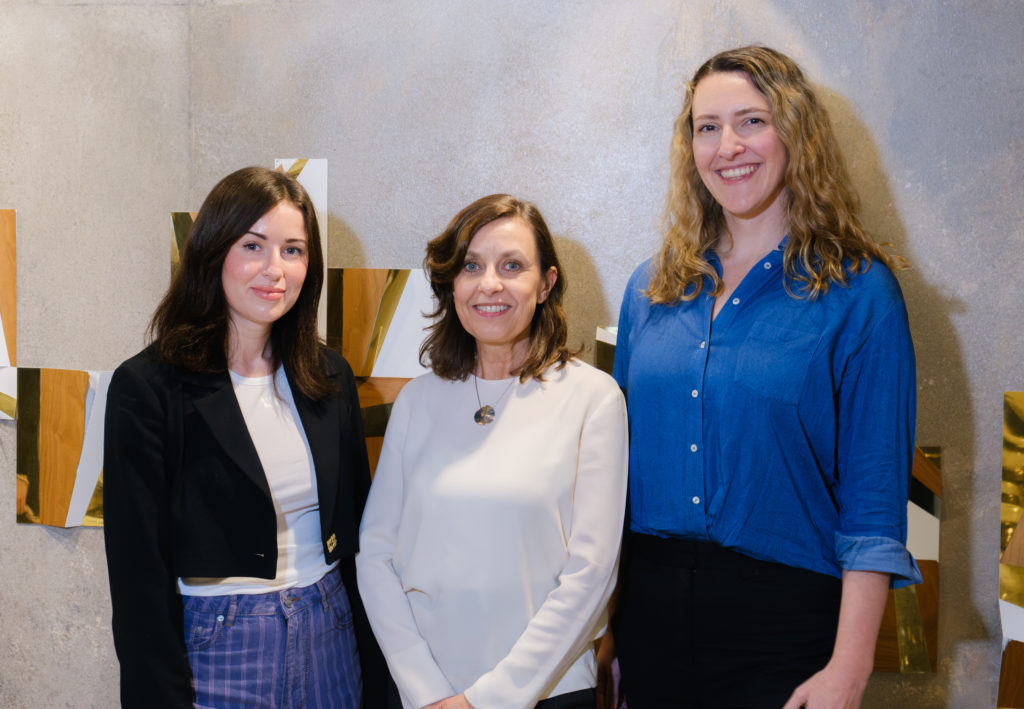
Meet The Judges
After running through the details of this year’s manufacturing challenge, it was time to hear from our incredible judging panel: Chelsea Franklin, Head of Advanced Concept Design, PANGAIA; Adam Mansell, CEO, UKFT; Gillian Lipton, Head of Sustainability, Alexander McQueen; Ella Gould, Head of Circularity and Innovation, Selfridges, and Matthew Drinkwater, Head of Fashion Innovation Agency, UAL: London College of Fashion.
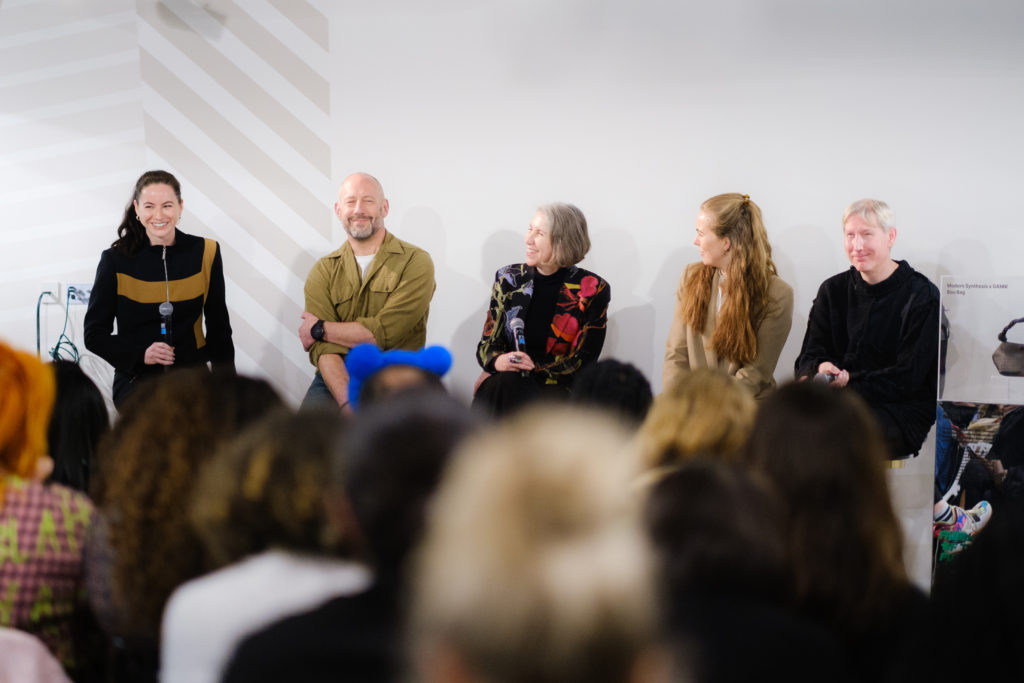
Discussing their criteria for the challenge, Matthew Drinkwater said, ‘Above all, I want to feel excitement for an application that I’m reading. It’s that magical moment…you want to transform the innovation into a real thing.’
Ella Gould added, ‘I’m always sceptical when someone comes to me with big tech and they only talk about the technology. Come to me with a problem, tell me the problem that you’re solving or why you’re doing something better. That for me is when the juices start flowing and I get really inspired.’
Gillian Lipton stressed the importance of time. ‘For me it’s all about finding a solution that is scalable, but also that I don’t have to wait too long for. I’m aware that things take time, in terms of innovation and new materials, but we don’t have time!’
Adam Mansell stated the biggest problem for him was volume. ‘I love new materials, new materials are fantastic, but if someone came up with a concept that would allow us to take all the cotton, polyester, and wool that we use, capture it, recycle it, get it manufactured in the UK, that gets my vote. You’d get lifetime membership to UKFT if you can solve that! But genuinely that’s where the problem is. That’s where the focus really needs to be.’
Chelsea Franklin urged applicants to consider the customer. ‘Functionality is obviously very important in terms of innovation performance, but also understanding how to convince a consumer to buy something, such as an alternative fabric – why? If the price is so much more significant, why should they purchase it? How do you tell that story? Build that narrative?’
The event concluded with key advice from the judges. Matthew Drinkwater advised applicants to think about clarity of message. ‘What problem are you solving? Answer all of those questions fully and critically, and you stand a really good chance of getting through.’
Chelsea Franklin echoed this. ‘Articulating your vision is a skill in itself. We want to know what problem you’re solving, problem solution framing, and why we should care. If you can answer that clearly and visually that’s my top tip.’
‘Don’t bring me something that’s been done five years ago,’ Adam said. ‘Do your homework. Do proper market research. Also read the application questions carefully and answer them clearly. Look at the finances bit, because it’s really important that you’re thinking beyond the initial. Think about what the future looks like, and don’t tell me that you’re going to be a billion pound turnover company in five years time. It’s hard work. It takes a lot of effort and collaboration and that should not be why you’re in this space, you should be in this space to solve a problem.’
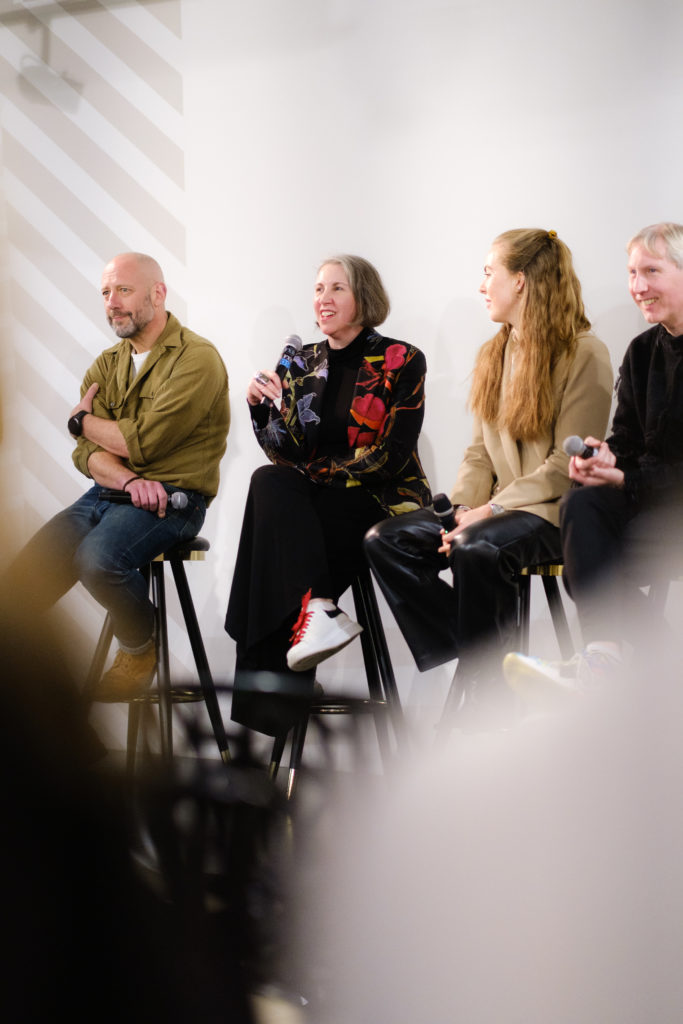
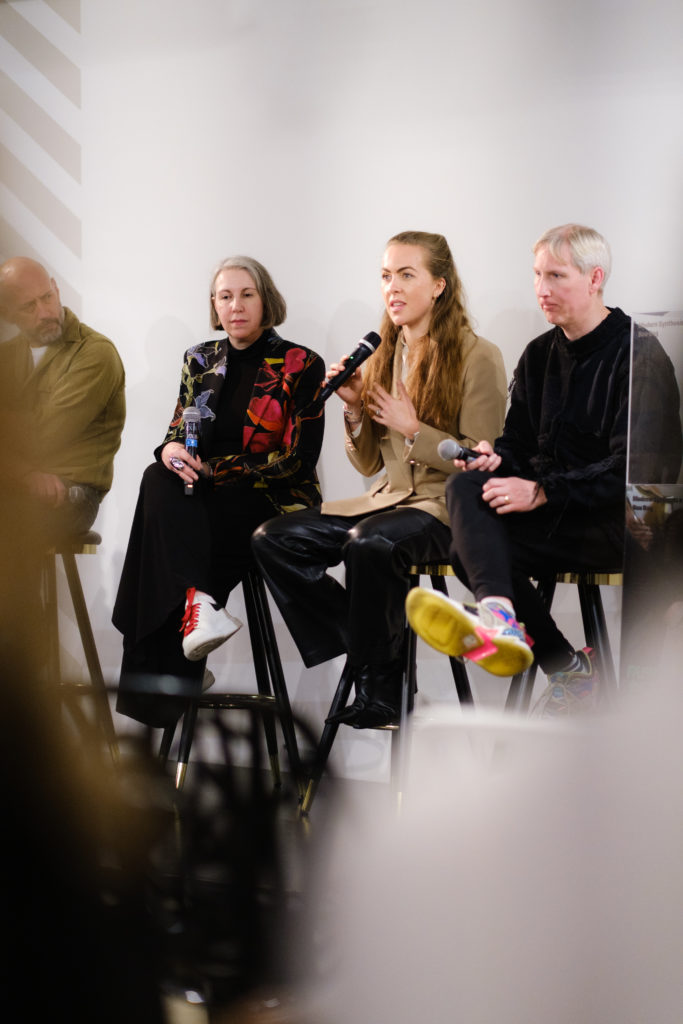
Do you think you’ve got what it takes to manufacture a new sustainable solution? Want to be in with a chance of winning £15,000? Applications for Manufacturing Futures 2024 are now open!
Follow us on Instagram, LinkedIn, Facebook and Twitter to stay update-to-date on our latest events and opportunities:
- Instagram: @fd_ldn
- LinkedIn: Fashion District – London
- Facebook: Fashion District London
- Twitter: @fd_ldn

